

77 Writing Prompts for 7th Grade
No matter where your education takes you in the future, writing is arguably the most important skill you’ll ever use.
The prompts below contain a variety of writing styles so you can work on things you need to improve, but also choose the style you like best.
Have fun and express yourself!
Using This Guide
Our writing guides are written for you to use however you’d like.
If you’re not sure where to start, here are some ideas to help you pick a prompt:
- Challenge yourself to use one prompt every day for a week (or even a month!)
- Use a random number generator to pick a number between 1 and 77
- Count the number of letters in your full name. Use that number to pick your prompt.
The Writing Prompts
- What are you most looking forward to in 8th grade? Why?
- If you could meet any celebrity, who would it be? What would you talk about?
- Write a detailed review of the last book that you read.
- How is the way you act at school different from the way you act at home?
- Write about a time when you gave in to peer pressure.
- Write a poem, essay, or short story using the following words: diversity, acknowledge, necessity, aspire
- Explain the importance of extracurricular activities.
- Write a story about a locker that leads to a magical world.
- Write a poem about growing up.
- Write a persuasive essay encouraging your peers to recycle.
- Explain your favorite sport or hobby in detail.
- How do you define feminism? Why is feminism so important today?
- Write about a time when trying to help someone backfired on you.
- If you could live inside any video game, which game would it be? Why?
- Do you feel that society has become too reliant on technology? Explain.
- Write an essay about the importance of mental health.
- Tell the detailed story about how you met your best friend.
- Write a story about a 7th grader whose determination to be the best gets them into trouble.
- Pick an athlete and write 5-7 paragraphs about their accomplishments. Explain why you admire them.
- How has the internet changed the way we live?
- How can your school or community be more accessible to those with special needs?
- Write a short story about a classmate whose dog literally ate their homework.
- Would you rather live in a big city or small town? Why?
- Compare and contrast being a teenager in 1922 and today.
- Pick a prominent woman in history. Write about her accomplishments and what you admire about her.
- Write about your day from your teacher’s perspective.
- Write a letter to someone in your family that you admire.
- How are you and your best friend alike? How are you different?
- Write about a time when you felt anxious. What did you do to resolve your anxiety?
- How would you handle someone cutting in front of you in a very long line?
- Would you rather have the power of invisibility or the ability to read minds? Explain.
- Would you rather spend a week at the beach or a week in the mountains? Why?
- What is something that you used to enjoy that you now feel is embarrassing? Why do you think you feel that way?
- Have you ever held an important leadership role? What did you do? How did it make you feel?
- What is one lesson you’ve learned from someone unexpected?
- You wake up in the morning and find yourself on a deserted island. What do you do next?
- Do you prefer Marvel or DC? Explain.
- Explain the importance of protesting.
- Write a poem, story, or essay using the following words: potential, authentic, legacy, hilarious
- Write a story about your favorite book character, set in the world of your favorite movie.
- Think of a school rule that is outdated. Write a letter convincing your principal to make the change.
- How does advertising have a negative impact on society? Explain your answer.
- Pretend you are a superhero. What is your superpower? How do you help others?
- If you could do one thing to change the world, what would it be? How would you change it?
- What can schools do to make sure that graduates are ready to join society?
- Have you ever witnessed or been a victim of racism? How did it make you feel?
- Compare and contrast the pros and cons of virtual learning versus in-person classes.
- Write a detailed nonsensical reason why the sky is blue.
- Do you think that there are some beliefs worth dying for?
- What do you want to be when you are older? Explain in detail.
- What genre of music is the best? Why?
- Compare and contrast the pros and cons of teens using social media.
- Write your speech convincing your peers to vote for you for student body president.
- Describe a time when you set a goal and followed through.
- What makes your hometown special? Explain in detail.
- Is it better to be famous or respected? Why?
- Describe the last sporting event or concert you attended.
- What is it like to be a 7th grader? What are some things you like and dislike?
- Do you think the voting age should be lowered? Explain.
- Why was Barack Obama essential to the future of our country?
- Which of your senses do you think is most important? Why?
- Research Ruth Bader Ginsberg. Write an essay about her accomplishments.
- Describe in detail the weirdest thing you’ve ever seen.
- Do you have a special talent? Describe it.
- Which natural disaster do you fear most? Why?
- Describe a time when you felt vulnerable.
- Would you rather be able to fly or to breathe under water? Why?
- Does your school do enough to prevent bullying? How could they improve?
- How can we learn positive lessons from disappointments?
- What are some alternative products you could use to decrease your carbon footprint?
- How are you different as a 7th grader from when you were seven years old? Use examples.
- Which national park would you most like to visit? Why?
- Would you rather time travel to the future or the past? Why?
- What is the most important thing you learned in 7th grade?
- What is the best ice cream flavor? Why?
- What could your school and community do to be more inclusive of LGBTQIA+ individuals?
- Write about the funniest thing that’s ever happened to you.
Looking For More?
We’ve got a ton of great writing prompts and resources to help young writers become their very best.
If you don’t see something you’re interested in, let us know. We’d love to hear from you!
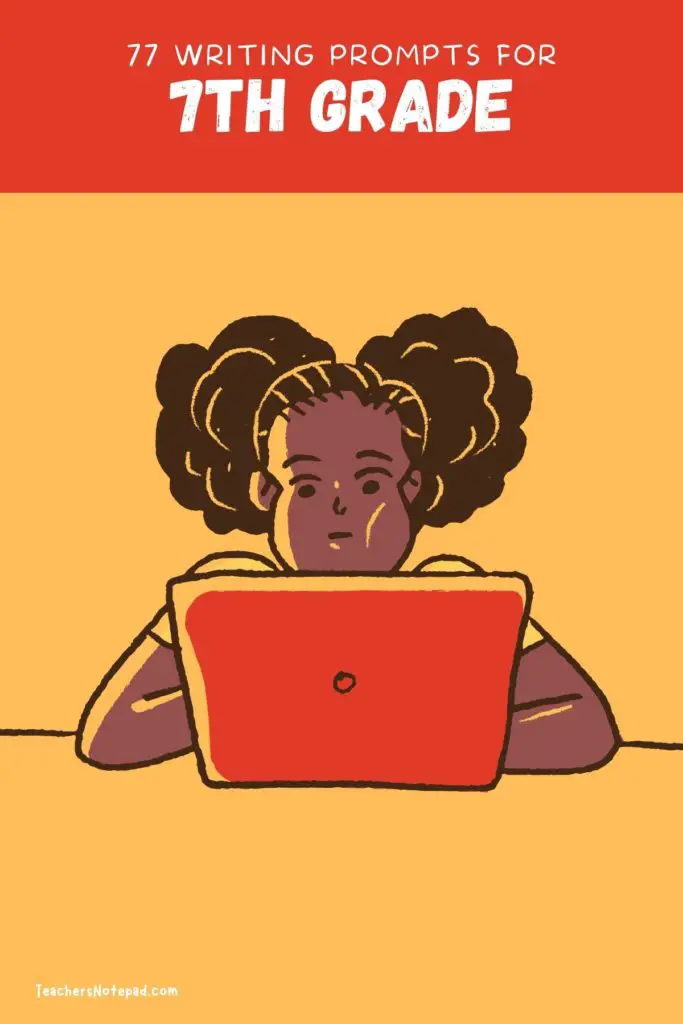
- Writing Tips
- 500+ Free Fiction Writing Prompts For Adults By Genre
- Self Publishing 101
- Best Writing Books
- Dragon Dictation Software Review
- Editing Software
- Email Marketing
- Formatting Software
- Gifts for Writers
- MasterClass Reviews
- Online Courses
- Scrivener 3 Review
- Website Hosting
- YouTube Channels
Select Page
100 Amazing 7th Grade Writing Prompts
Writing Prompts |
Disclosure: The content on this site is free. Some of the links below are affiliate links from companies like Amazon.com and if you click the links and make a purchase we will receive a small commission at no additional cost to you. Thank you in advance if you decide to support our site by using our affiliate links!
100 Amazing 7 th Grade Writing Prompts
Looking for some great writing prompts to help spark your students’ interest in writing? If yes, this post is just what you need. From persuasive writing prompts to compare and contrast, we have much to help 7 th graders refine their core writing skills.
We’ll discuss:
- Compare and contrast writing prompts
- Persuasive writing prompts
- Expository essay writing prompts
- Creative essay writing prompts
- Descriptive essay writing prompts
Compare and contrast writing prompts for 7 th Grade
- How are coffee and Tea different? How are they same?
- Is life as a 7 th grader today different than it was when your parents were studying in the 7 th grade? If yes, in what aspects it is different?
- What’s different between a cheetah and a tiger?
- What family traits you share with your siblings (or if you don’t have siblings, then with your cousins)?
- Pick two of your most favorite characters in books. How are the alike? How are they different?
- What does the phrase “comparing apples to oranges” mean? Is there absolutely nothing in common between these two fruits? If the answer is no, write their common traits?
- What is the best spaghetti you ever had? Which one was the worst? How would you compare the two?
- What are the similarities and differences between Barrack Obama and Abraham Lincoln?
- Pick your two favorite role models? In what ways they are the same and different?
- What are the similarities and the differences between you and your best friend?
- How smartphone is different than a traditional telephone?
- Pick any two movie stars you like. In what ways they are the same and different?
- In what ways a photograph is different than a drawing? How are they alike?
- Think of the last two family vacations your family has taken. Compare and contrast them.
- They say, “Pen is mightier than the sword.” Explain in what ways Pen is mightier.
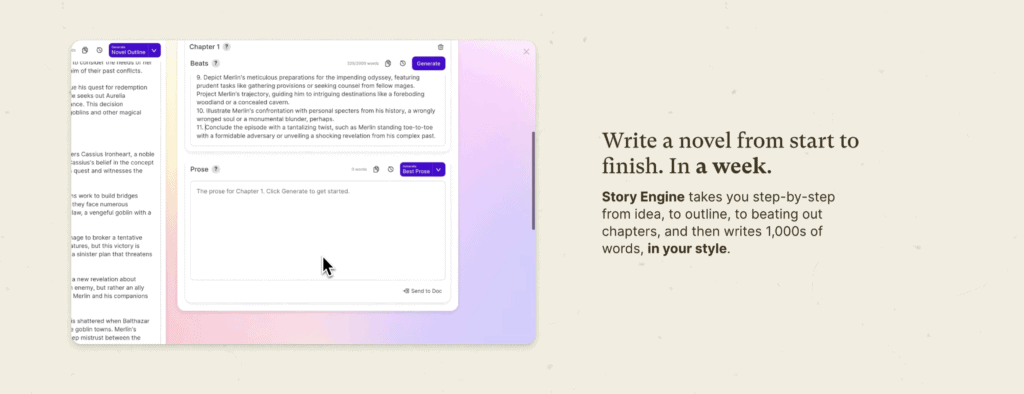
Persuasive writing prompts for 7 th Grade
- Imagine you are running for the school council. What changes would you introduce at your school?
- What would the perfect lunch menu look like?
- Think about a problem the local community is facing. Design a solution for the problem and write a strong letter to the community leader citing reasons why they should give your recommendation a try.
- Think about a problem your school is facing. Come up with a way to solve the problem. Write a letter to the principal stating why your solution is worth a try.
- What is one rule in your family that you think is outdated and should be done away with? Give your reasons.
- What is one school rule that you think is outdated? Convince school leaders to drop it.
- You love pets and want to bring one home. However, your parents are dead against it. Convince them by highlighting the benefits of having a pet at home.
- Make a list of three advertisements that you think affect consumers in a negative way. Explain why these ads should stop running.
- Studies suggest teens need more hours of sleep than adults. Design a proposal to convince school authorities to start school late.
- Some malls prohibit entry of anyone under 18 during certain times if they are not accompanied by adults. Do you think this rule is fair? Explain your position.
- Edited images of models can have a negative impact on readers. Write an essay to convince publishers to do away with this practice.
- Studies show that teens are spending more time in front of a screen than ever before. Come up with strategies that can help bring down teen screen time.
- Gaming addiction is rampant in teens. How can we tackle this menace? What’s your take on this? Explain in detail.
- Research on social media and teens suggest that technology may increase bullying and peer pressure. Do you agree? Defend your position.
- Many teenagers today have a phone addiction. Do you have that problem or do you know someone who has it?
Narrative Essay Writing Prompts
- Write about a time when you broke a promise. How did you feel? What did you learn from the experience?
- Write about a time when you successfully kept a resolution? How did you feel?
- What good qualities you have inherited from your parents? In what ways you are different from your parents.
- Imagine you could pick any summer job you want. What would you pick and why?
- What makes a good teacher? What qualities are needed to become a good teacher?
- Is gossip something that’s inherently wrong? Or are there some instances when it is okay to gossip? Wherever possible, use examples to make your point.
- Write about a time when you lent someone a helping hand. What was the situation and how did you feel?
- Difficult times bring families together. Do you agree? Has your family gone through such an experience? Describe in detail.
- Sometimes people are embarrassed about things they used to enjoy when they were younger, like a toy or a pet. Describe something that you now find embarrassing but enjoyed earlier.
- Many say there’s no place like the hometown. What makes your hometown special?
- Write about a time when you lost something that you loved dearly. Describe your experience.
- Write about a time when you and your best friend had a serious fight. Describe the situation that caused it, who was more at fault (or were both equally at fault?), and how you two cleared up the air.
- Write about a time when you had to assume a leadership role. What did you learn from this experience?
- Write about the best prank someone has ever played on you. What made it so memorable?
- Explain what makes your favorite book so pleasurable or relatable to you.
- Explain what makes your favorite TV show so enjoyable.
- Describe your relationship with your best friend and what makes it so special.
- Write one thing you really wish your parents or teachers knew or understood about you.
- Write an essay about an unforgettable trip you have had with your family.
- Write an essay about how sports help shape a student’s all-round personality.

Expository Essay Writing Prompts for Grade 7
- Would you rather attend private school or public school or be homeschooled. And why?
- If you could live anywhere in the world, which place would you pick and why?
- Who do you admire from history and why?
- If you had to choose five books to take to a desert island, which ones would you pick?
- What does mean to have a school spirit? Explain in detail and with examples.
- Technology has changed the way students learn today. Is the change has only been positive? Or are there unwanted side effects of this change?
- Write a review about the last book you read.
- Think about one problem in your school, could be bullying or too much homework, that you would like to see addressed most. How would you solve it?
- Climate change is a huge problem facing us. Write an essay listing five simple things that we can do minimize the damage.
- What changes your school should make to make things easier for students with autism or sensory issues?
- Some students feel a lot of stress when they are in the middle school. What do you think is the best way handle this issue?
- How can your school help the local community to recycle?
- Wasting water is seriously bad for our planet. How can we minimize this waste?
- Should the voting age be lowered? What’s your take on this and why you have chosen to take that particular stand?
- Is homework good for students? Explain your viewpoint and give supporting examples.
- Write a review of a recent TV show or movie you loved. Give reasons why others should watch it.
- Write a review of a recent TV show or movie you hated. Why didn’t you like it? What was so about this program or movie?
- How is participating in extracurricular activities beneficial for students?
- Bullying and peer pressure can make life in school difficult. Write about a time when you were bullied or pressured and how did it affect you.
- Drug addiction is a modern evil. Many teenagers fall into this trap. Write an essay how we can deal with this problem.
- Community service is an experience worth having. Write about a time when you did community service out of your own violation. How did you feel?
- A friend wants you to teach him or her how to prepare your favorite dish. Share the detailed, step-by-step process.
- What do you plan to do when you become an adult? Explain why you want to make that choice?
- Would you rather live in a small town or a big city and why?
- Would you rather be famous or respected?
Creative Essay Writing Prompts for 7 th Grade
- Write a story about your favorite characters from a film or book.
- Write a story from the point of view of a pet about spending a day alone at home.
- You’ve just discovered a new island. What happens next?
- You found a time machine in your backyard. What happens when you step into it?
- One day you wake up to find yourself in a foreign country. What happens next?
- You find out your family has kept a secret from you. What is this secret and why haven’t they shared it with you so far?
- You’ve just discovered there’s a door in your grandpa’s closet that leads into a jungle. What happens when you pass through it?
- If for once you could be the fly on the wall, whose conversation would you like to eavesdrop?
- Write a story from the perspective of an item in your refrigerator?
- You find a pair of jeans in a thrift store. When you try them on, you are transported into someone else’s life. What happens next?
- You find yourself snowed in all alone in your house for a month. There’s no phone service or electricity. How will you survive?
- Imagine that you can fly. What adventures will you have?
- Imagine that you can become invisible at a press of a button. What adventures will you have?
- If you could travel back in time and change one mistake that you have made in the past, what would be it?
- Imagine you are a pioneer in space exploration on Mars. Write about a typical day on the red planet.

Descriptive Writing Prompts for 7 th Grade
- When was the last time you saw a live baseball game? Describe your experience.
- When was the last time you saw a rainbow? Describe that day.
- Describe your bedroom. Include as many details as possible.
- Write about your favorite movie. Describe why do you like it so much?
- Write about your favorite cookie. What makes it so special? How it is made?
- Describe your favorite childhood pastime. Include as many details as possible.
- What will be the world like in the next 25 years?
- Describe what it’s like being a 7 th grader. Mention both the things you like and those you don’t.
- Describe a local attraction. It could be a museum, zoo, beach, or anything else.
- Imagine you open your school locker only to find a genie in a bottle. What happens next?
And with that we come to the end of this article. Remember, there’s only one way to improve your writing skills — practice writing every day. In addition to the prompts discussed above, here are some more in this post to help you hone your writing skills a little at a time.
Here are some other great free writing prompts for kids by grade:
- 3rd grade writing prompts
- 4th grade writing prompts
- 5th grade writing prompts
- 6th grade writing prompts
- Middle School Writing Prompts
Find Fiction writing prompts here .
Related Posts

100 Writing prompts for Middle School Kids
November 7, 2020

61 Scintillating Romance Writing Prompts & Story Ideas
August 10, 2018
100 creative 6th Grade Writing Prompts
December 7, 2020

95 Writing Prompts for Kids
October 31, 2020

“This site is owned and operated by FB Global Value LLC, a limited liability company headquartered in New Jersey, USA. FB Global Value is a participant in the Amazon Services LLC Associates Program, an affiliate advertising program designed to provide a means for sites to earn advertising fees by advertising and linking to Amazon.com. As an Amazon Associate, I earn from Qualifying Purchases . FB Global Value LLC also participates in affiliate programs with Bluehost, Clickbank, CJ, ShareASale, and other sites. Sites like Self Publishing Hub which are owned and operated by FB Global Value LLC are compensated for referring traffic and business to these companies.”
Unlocking Ideas: 100+ Prompts Tailored for the 7th-Grade Mind
By: Author Valerie Forgeard
Posted on August 17, 2023
Categories Writing
You’re about to dive into the world of writing prompts for 7th graders. You’ll discover their importance, explore various types, and learn how to choose the right one. This article aims to help you encourage creativity and boost critical thinking skills in your classroom or at home.
Key Takeaways
- Writing prompts ignite creativity and improve writing skills.
- Prompt categorization helps identify strengths and weaknesses.
- Challenging prompts can be rewarding.
- Understanding student interests is crucial for engaging 7th graders.
100 Writing Prompts for 7th Graders
Personal writing is like opening a window into your soul, allowing fresh insights to pour in and old doubts to flutter out. Every prompt is an invitation, a beckoning to delve deeper into your own psyche, experiences, and aspirations.
From your bravest moments to your most profound failures, these questions aim to guide you through a labyrinth of emotions, dreams, and memories.
Whether you’re a seasoned journal enthusiast or someone looking to start, this collection ensures that every day becomes an opportunity for introspection. Embrace the quest of understanding oneself, and let these prompts light your path.
- Write about a time you ventured out of your comfort zone.
- Reflect on your proudest achievement to date.
- If you could switch lives with someone, who would it be?
- Describe your ultimate leisure activity in detail.
- Recall a time fear gripped you.
- Sketch out your dream holiday scenario.
- Share a pivotal life lesson and its source.
- Narrate a day from your pet’s perspective.
- Envision an invention to better our world.
- List traits of a true friend.
- Reflect on a moment you swelled with pride.
- If you could reside anywhere, where would that be?
- Set a goal for this academic year.
- Talk about a moment of sheer disappointment.
- Dream up your superhero persona.
- Which possession holds great sentimental value?
- Plan your ideal weekend.
- Remember an instance when inspiration struck.
- Jot down things that tickle your funny bone.
- Offer a piece of advice for newcomers to your school.
- Paint a picture of your serene natural spot.
- Revisit a moment of profound gratitude.
- Describe your envisioned career path.
- Reflect on a holiday that warms your heart.
- Recall an experience with a hard-hitting lesson.
- Compliment yourself on a unique quality.
- Describe an unforgettable gesture of kindness towards you.
- Share feelings from a lonesome period.
- Define the markers of a commendable teacher.
- Take a trip down a cherished childhood memory lane.
- Introduce yourself to your role model.
- If you had a global platform for a day, what’s your message?
- Confront your greatest phobia.
- Chronicle a burst of creativity.
- Savor the memory of your most delectable meal.
- Celebrate what sets you apart from the crowd.
- Open up about facing and overcoming adversity.
- Rekindle one of life’s joyful milestones.
- If time travel were possible, where and when would you go?
- Describe your birthday bash of dreams.
- Recommend an unforgettable book.
- Unravel feelings from an anxious episode.
- Choose your dinner companion from any point in history.
- Revel in your favorite season’s charms.
- Salute your bravest act.
- Share three happiness sources.
- Reflect on a treasured family custom.
- If the zoo gates opened, which animal becomes your pet?
- Define the essence of friendship.
- If there’s one item in infinite supply, what’s your pick?
- Describe your ultimate weekend blueprint.
- Embark on your most thrilling adventure again.
- Spell out your most anticipated month.
- Recall a moment that tested your mettle.
- Who would attend your ideal birthday celebration?
- What qualities form a steadfast friend?
- Introduce your safe haven or retreat.
- If you were to compete in the Olympics, your sport is?
- Ponder upon a transformative experience.
- Which tune resonates with your soul?
- If any subject was available, what’s your elective?
- Share your strategy against looming fears.
- Detail your fantasy expedition.
- Reiterate a life-changing piece of advice.
- Unearth memories of a creative spree.
- Spotlight a goal for the upcoming year.
- Who stands as the beacon of heroism in your life?
- Set three targets for your current educational phase.
- Envision an unrestricted course for the next term.
- What activity makes weekends special for you?
- Recall a testing moment and its aftermath.
- Who’s the beacon of heroism in your world?
- Draft an action plan for an imminent objective.
- Explore an instance when motivation fueled you.
- If you could decode any subject next term, what would it be?
- Revisit an encounter that changed your perspective.
- If you could amplify a single trait, which would it be?
- What does an average day in your life look like?
- Share a moment when you stood up for something.
- Pen down your thoughts about personal growth.
- Recall an incident that evoked strong emotions.
- Describe a challenge and its valuable lessons.
- List hobbies that relax and rejuvenate you.
- Reflect on a time you surpassed your own expectations.
- Describe an act that left a lasting impact on you.
- Which creature comforts bring you the most joy?
- Share insights from an eye-opening book.
- Describe a random act of kindness you’ve recently witnessed.
- Chronicle a moment of sheer determination.
- If you were a novel character, who would you be?
- Reflect on an experience with a profound impact.
- Which fantasy realm would you reside in?
- Recall a time when a movie deeply moved you.
- If you authored a book, what’s its core message?
- Share your feelings on an unresolved personal challenge.
- Remember a moment that tested your patience.
- Explore feelings from a challenging transitional phase.
- Share an unexpected source of inspiration.
- Describe a ritual that centers and grounds you.
- Reflect on a time you stepped up as a leader.
Understanding the Importance of Writing Prompts

It’s vital for 7th graders to understand that writing prompts aren’t just school tasks, they’re tools to ignite their creativity and improve their writing skills. Prompt categorization helps you identify your strengths and weaknesses in different areas of writing. For instance, are you better at descriptive or narrative pieces? Use these prompts as a pathway to discover your unique voice.
Prompt diversity is also crucial. By responding to various types of prompts – from persuasive essays about current events to creative stories about imaginary worlds – you’ll become a more versatile writer. Don’t shy away from challenging ones; they can sometimes be the most rewarding!
Exploring Different Types of Writing Prompts

Let’s delve into the various kinds of assignments they’ll encounter. The key to prompt variety is understanding its role in student engagement.
You see, diverse prompts can cater to different learning styles and interests, making writing tasks more appealing.
Consider narrative prompts that encourage students to fabricate a story or share personal experiences. These stimulate creativity and self-expression.
Descriptive prompts, on the other hand, refine sensory observation skills as students paint vivid images with words.
Compare-contrast prompts foster critical thinking by analyzing similarities and differences between subjects.
Lastly, persuasive prompts develop argumentation skills as students defend their standpoints.
Tips to Choose the Right Writing Prompt

You’re about to dive into the art of choosing the right writing prompt, and it’s crucial you understand three key factors: student interests, difficulty level, and learning outcome.
It’s not enough to pick a prompt at random; you’ve got to hone in on what your students are passionate about to truly engage them.
Balancing their interests with an appropriate challenge and clear learning goals will make all the difference in their educational journey.
Understanding Student Interests
Understanding your students’ interests can significantly enhance your ability to create engaging writing prompts. It’s essential to consider student hobbies and extracurricular activities while crafting these prompts. This step not only fosters a connection between you and your pupils, but it also makes the learning process more enjoyable for them.
Here are some ways to explore their interests:
- Conduct surveys or questionnaires
- Keep an eye out for what they get excited about in class
- Engage with parents or caregivers about student hobbies outside school
- Observe their participation in extracurricular activities
Difficulty Level Consideration
It’s equally important to take into account the difficulty level of the tasks you’re assigning. You must strike a balance with prompt complexity to encourage student adaptability, not frustration. Too simple, and they’re bored; too hard, and they may give up.
Consider their academic abilities: Are they struggling or excelling? This requires adjusting your expectations and prompts accordingly. Engage them with challenges that stretch their capabilities but remain within reach.
Also, diversify task types — mix easier tasks with complex ones. This approach fosters resilience as students navigate different levels of challenge while boosting their confidence when they complete trickier assignments successfully.
Prompt’s Learning Outcome
Right on the heels of considering the difficulty level, you’re now ready to tackle ‘Prompt’s Learning Outcome.’
Understanding the outcome is paramount in prompt evaluation and curriculum integration. So, how can you ensure that your writing prompts are pedagogically effective?
- Start by aligning them with specific learning objectives.
- Next, consider how they fit into wider units or themes in your curriculum.
- Evaluate whether they encourage critical thinking and creativity.
- Lastly, think about their potential for engaging students and sparking interest.
Encouraging Creativity in 7th Graders

You’re about to explore three essential elements that can ignite the spark of creativity in your 7th graders: boosting creative thinking, innovative writing exercises, and nurturing artistic expression.
Each component is designed not only to enhance their academic skills but also to unleash their imaginative power.
Boosting Creative Thinking
Boosting creative thinking is often achieved through engaging in various forms of art, such as painting and music. But let’s not forget about writing too! You can overcome creativity barriers by using unconventional prompts.
Here are a few tips to help you:
- Break the norm: Use prompts that challenge traditional thinking. This could be an unusual scenario or a different perspective.
- Embrace randomness: Let unpredictability fuel your imagination. A random word or image can spark unique ideas.
- Think visually: Drawings or photos can serve as great prompts too, stimulating your visual intelligence.
- Be open to failures: Don’t fear making mistakes; they’re part of the creative process.
Innovative Writing Exercises
Let’s dive into some innovative exercises that’ll surely ignite your creative writing skills. Experiment with prompt variations and storytelling techniques to stretch your imagination.
For instance, try altering a well-known fairy tale by changing its setting or ending. This engages your creativity and helps you explore different narrative possibilities.
Another exercise is to use an object in your room as the central element of a story. Describe it vividly, give it a backstory, make it the hero or villain – there’re no limits!
Also consider retelling an event from multiple perspectives. It can be any historical event or even something mundane like making breakfast.
These exercises aren’t just fun but also great training in perspective-switching, character development, and plot creation. Give it a shot!
Nurturing Artistic Expression
Nurturing artistic expression isn’t only about mastering technical skills. It’s also about exploring one’s emotions and experiences in a creative way. As you facilitate your 7th grader’s artistic development, consider employing different expression techniques that will help them convey their thoughts and feelings effectively.
Here are some strategies to guide you:
- Encourage open-ended creativity: Don’t limit them to traditional forms of art.
- Provide an environment that fosters imagination: Surround them with inspiring materials and resources.
- Teach them how to use various tools: Brushes, pens, clay – the choices are endless.
- Promote emotional intelligence: Help them understand their feelings and translate those into art.
Writing Prompts to Boost Critical Thinking Skills

Encouraging critical thinking skills in 7th graders can be achieved through well-crafted writing prompts. Promoting empathy and digital literacy is a great way to do this.
Begin by presenting situations that require students to step into someone else’s shoes. Ask them how they’d feel, react, or handle those circumstances. This will not only stimulate their imagination but also foster understanding and compassion.
Incorporating digital literacy is equally important. You can assign tasks where they’ll need to evaluate the credibility of online sources or identify fake news. As they navigate these challenges, they’re honing their ability to discern truth from falsehood—an essential skill for the 21st century.
Narrative Writing Prompts for 7th Graders

You’re about to embark on a journey through narrative writing prompts specifically designed for 7th graders.
We’ll delve into the exploration of personal experiences, create imaginative scenarios, and reflect deeply through journal entries.
Get ready, as this adventure will not only hone your writing skills but also give you a chance to introspect and voice your thoughts in an engaging way.
Exploring Personal Experiences
Think about a time when you’ve faced a tough decision and what you learned from that experience. Exploring personal experiences can be an insightful journey into your own personal growth documentation, often revealing unseen perspectives.
When writing about personal experiences, consider these elements:
- Describe the situation in detail
- Identify the choices you had available
- Explain why it was a challenging choice
- Share what you learned from this experience
Writing about your own life isn’t just engaging for others to read, it’s also enlightening for yourself. It allows exploration of unseen perspectives and provides invaluable documentation of your personal growth.
Imaginative Scenario Prompts
Let’s dive into imaginative scenario prompts. They’re a fantastic way to spark creativity and broaden your horizons.
Picture this: you’re exploring alien encounters on a distant planet. How do you communicate? What does their society look like? These prompts push you to think outside the box and concoct wildly inventive narratives.
Now, let’s take a deep breath and plunge into underwater adventures. You’re swimming among vibrant coral reefs, encountering mysterious sea creatures. How do you navigate this new environment? What undiscovered species might lurk in the depths?
These scenarios aren’t just fun; they enhance critical thinking and writing skills. So next time you need inspiration, remember these unique scenarios. They’ll certainly stretch your imagination!
Reflective Journal Entries
Reflective journal entries can be quite enlightening. They’re an excellent tool for processing your thoughts and emotions. As a 7th grader, these can help you understand your emotional intelligence and navigate peer interactions better.
Consider the following prompts for your reflective journal entries:
- Reflect on a recent situation where you effectively managed your emotions.
- Narrate an incident involving a peer interaction that led to personal growth.
- Discuss how understanding others’ emotions has improved your relationships.
- Ponder over the role of empathy in enhancing emotional intelligence.
Writing about these will not only refine your writing skills but also boost self-awareness. So, grab a pen and start exploring yourself through words! Remember, it’s not just about recording events but recognizing feelings too.
Persuasive Writing Prompts for 7th Graders

You’ll find these persuasive writing prompts for 7th graders engaging and challenging. They are specially designed to have cultural relevance, making them more relatable and interesting for your students. For instance, one prompt could be debating the significance of celebrating diverse cultures in schools.
Moreover, incorporating humor into these prompts can make the learning process more enjoyable. You can ask your students to write a persuasive essay on why their favorite comedian should be considered a national treasure. This task will surely spark their interest and creativity.
Using these tactics not only enhances their critical thinking but also improves their ability to communicate effectively with others. It’s an excellent way to prepare them for real-world situations while keeping things fun and engaging!
Expository Writing Prompts for 7th Graders

Switching gears, expository tasks encourage your 7th grade students to investigate an idea, evaluate evidence, and present a clear point of view on the subject. Here’s where prompt selection strategies come into play. Selecting the right expository writing prompts can trigger their imagination and analytical skills.
Expository writing benefits are plenty:
- It enhances critical thinking.
- Boosts research skills.
- Improves clarity in communication.
- Increases knowledge on various topics.
You’ll find that it’s not just about improving their writing but also enriching their understanding of the world around them. So don’t hesitate to challenge them with diverse topics from technology to social issues. Remember, the goal is to make learning enjoyable and engaging while fostering intellectual growth.
Dealing With Writer’s Block

When tackling writer’s block, it’s important that you don’t let it intimidate you; instead, view it as a challenge to overcome. Consider this block overcoming strategy: seek inspiration from different sources and ignite your creativity. Maybe read a book or watch a movie that excites you. Take a walk in nature or listen to some music. You’d be surprised how these little things can spark your creative ignition.
How to Use Writing Prompts Effectively

Utilizing thought-provoking questions effectively can significantly aid in overcoming writer’s block and reigniting your creativity. To make the most of writing prompts, consider prompt personalization. Tailor each prompt to resonate with your interests or experiences.
Here are some tips on how to use writing prompts effectively:
- Personalize the scenario: Change the characters or setting to something more relatable.
- Use it as a jumping-off point: Let the prompt inspire you, but don’t feel limited by it.
- Add a twist: Modify the prompt to add an unexpected element that sparks your creativity.
- Set a timer: This can increase your writing motivation by creating a sense of urgency.
The Role of Feedback in Writing

It’s critical to understand the role of feedback in the writing process, as it offers a fresh perspective and can help hone one’s skills. Peer evaluation plays a significant part here. It allows you to receive reactions from someone who is on an equal footing with you and understands your position.
Feedback interpretation is another crucial aspect. You shouldn’t take criticism personally, instead see it as an opportunity for growth. Understand that each piece of advice given is meant to improve your writing abilities.
Example Writing Prompts and Responses

You’re going to find examples of prompts and responses incredibly useful for understanding the concept better. When it comes to prompt selection, it’s crucial to choose ones that will spark student motivation and push their thinking boundaries. Remember, you want your students not only to write but also to enjoy the process.
Here are a few example prompts:
- Write about a time when you had to make a tough decision.
- Describe a place that makes you feel happy.
- Imagine what life would be like if we could live on another planet.
- Craft an argument for or against school uniforms.
The aim is not just completion, but engagement. So, always consider students’ interests and aspirations when selecting prompts. This approach ensures they stay motivated throughout their writing journey.
The Benefits of Regular Writing Practice

After exploring various writing prompts and seeing how they can be tackled, let’s now dive into the benefits of regular writing practice.
As a 7th grader, you’re likely encountering more complex language tasks. Regular writing doesn’t just improve your ability to craft engaging stories or persuasive arguments; it also contributes significantly to your language development and vocabulary enhancement.
By consistently practicing, you’ll naturally expand your vocabulary as you strive to express yourself accurately and eloquently. You’re not just jotting down words—you’re learning how they interact, how they convey nuanced meanings, and how best to use them in different contexts.
So keep sharpening that pen (or keyboard!). The benefits are manifold: better academic performance, improved communication skills, even enhanced critical thinking.
Embrace the journey!
So, you’re all set to boost your 7th grader’s writing skills. Remember, the perfect prompt can ignite their creativity and critical thinking. Use them effectively, give constructive feedback, and encourage regular practice.
Dive into this exciting world of words together and watch them grow as confident, articulate writers!
Writing Prompts for 7th Grade
Compassionate Eye Foundation/Robert Kent/Getty Images
- Lesson Plans
- Grading Students for Assessment
- Becoming A Teacher
- Assessments & Tests
- Elementary Education
- Special Education
- Homeschooling
:max_bytes(150000):strip_icc():format(webp)/squareheadshot-5b6da9aec9e77c0050a6e8a5.jpg)
By seventh grade, students should be refining the core writing skills of brainstorming , researching, outlining, drafting, and revising. In order to hone these skills, seventh-grade students need regular practice writing a variety of essay styles, including narrative, persuasive, expository , and creative essays. The following essay prompts offer age-appropriate starting points to help seventh graders flex their writing muscles.
Narrative Essay Writing Prompts
Narrative essays share a personal experience to tell a story, usually to make a point rather than merely to entertain. These narrative essay prompts encourage students to describe and reflect on a story that's meaningful to them.
- Embarrassing Pasts - As people get older, they are sometimes embarrassed by things they used to like, such as toys, television shows, or nicknames. Describe something that you used to enjoy that you now find embarrassing. Why is it embarrassing now?
- Bonds of Hardship - Sometimes difficulties draw families closer. Describe something that your family endured together that strengthened your relationships.
- There’s No Place Like Home - What makes your hometown special? Explain this special quality.
- New Kid in Town - Being new to a town or school can be challenging because you don’t know anyone, or exciting because no one knows you and your past. Describe a time when you were the new kid.
- Finders Keepers - Write about a time when you lost (or found) something of value. How did that experience affect your opinion of the saying, “Finders keepers; losers weepers?"
- Follow the Leader - Describe a time when you were in a leadership role. How did it make you feel? What did you learn from the experience?
- April Fools - Write about the best prank you’ve ever played on someone (or had played on you). What made it so clever or funny?
- Bon Appetit - Special meals can be powerful memory-makers. Write about a specific meal that stands out in your memory. What made it so unforgettable?
- Bon Voyage - Family trips and vacations also create lasting memories. Write an essay detailing your favorite family vacation memory.
- Batter Up - Write about a valuable lesson that you learned while playing your favorite sport.
- Best Friends Forever - Describe your friendship with your BFF and what makes it so important to you.
- The Real Me - What is one thing you wish your parents, teachers, or coaches really understood or knew about you?
- TV - Explain what makes your favorite television show so enjoyable or relatable to you.
Persuasive Essay Writing Prompts
Persuasive essays use facts and reasoning to convince the reader to embrace the writer’s opinion or take a course of action. These essay prompts empower seventh graders to write persuasively about an issue they genuinely care about.
- Outdated Laws - What is one law or family or school rule that you think needs to be changed? Convince lawmakers, your parents, or school leaders to make the change.
- Bad Ads - Advertising can have a powerful impact on consumers. What is a product that you’ve seen advertised that you don’t think should be? Explain why the media should quit showing these ads.
- Puppy Love - You want a pet, but your parents don’t think you need one. What would you say to change their minds?
- Lights, Camera - What is your favorite book of all time? Write an essay convincing a producer to make a movie about it.
- Snooze Button - Studies have shown that tweens and teens need more sleep. Write a proposal for a later school start time.
- Body Shop - Magazines can negatively impact their readers’ body image by using edited images of models. Convince a teen magazine publisher that they should not use heavily-edited model images in their publication.
- It Can’t Be Over - The network is canceling your favorite television show. Write a paper convincing the station that they’re making a mistake.
- Curfews - Some malls have policies forbidding kids under 18 to be at the mall without adult supervision during certain times. Do you think this is fair or unfair? Defend your position.
- Team Spirit - Should homeschooled students be allowed to play sports on public or private school teams? Why or why not?
- Smartphones - All of your friends have the latest smartphone, but you only have a “dumb phone.” Should your parents upgrade your phone, or are smartphones for middle school kids a bad idea?
- Bullies - Some dogs, such as pit bulls or Dobermans, are labeled “bully breeds.” Is this label deserved or undeserved?
- Money Can’t Buy You Love - People say that money can’t buy happiness, but some studies have shown that people with higher incomes may be happier . Do you think this is true? Why or why not?
- Ratings - There are age restrictions on movies and video games, ratings on television shows, and warning labels on music. Computers and smartphones offer parental controls. Do adults have too much control over what kids watch and listen to or do these restrictions serve a valuable purpose?
Expository Essay Writing Prompts
Expository essays describe a process or provide factual information. These prompts can serve as jumping-off points for the explanatory process.
- School’s in Session - Would you rather attend public school, private school, or be homeschooled. Explain the benefits of your choice.
- Admiration - Who do you admire from your life or history? Write an essay describing how their character or contributions to their community have earned your respect.
- Global Community - If you could live anywhere in the world, where would you live? Write about your dream hometown and why you want to live there.
- Peer Problems - Peer pressure and bullying can make life as a middle school student difficult. Describe a time you were pressured or bullied and how it affected you.
- Order Up - A friend wants to learn how to make your favorite food. Detail the process, step-by-step, so your friend can recreate the dish.
- Addictions - Many people are impacted by drug or alcohol addictions. Share facts about how the use of these substances negatively affects families or communities.
- Serve Others - Community service is a valuable experience. Describe a time you volunteered. What did you do and how did it make you feel?
- City or Country Mouse - Do you live in a big city or a small town? Explain why you do or don’t like living there.
- Aspirations - What do you want to be when you’re an adult? Explain why you’d choose that career or what you’ll do to prepare for it.
- Point in Time - Sometimes people bury time capsules so future generations can learn about the past. What would you include to give an accurate snapshot of life in the current time?
- Hobbyist - You’re friend wants to take up your favorite hobby. Explain it to him.
- SOS - A natural disaster has destroyed homes and businesses in a nearby city. Describe what you can do to help.
- Wonder Twin Power - Some superheroes can fly or become invisible. If you could have any superpower, what would it be and why?
Creative Essay Writing Prompts
Creative essays are fictional stories. They use plot, character, and dialog to engage and entertain the reader. These prompts will get the creative juices flowing.
- Fan Fic - Write a story about your favorite characters from a book, film, or television show.
- Cats vs. Dogs - You have two pets of different species. Write a story from their point of view about a day at home alone.
- Time Travel - You find a time machine in your backyard. What happens when you step inside?
- Dream State - Think about a time when you woke in the middle of a vivid dream. What would have happened if the dream hadn’t been interrupted?
- New Door - You’ve just discovered a door that you’ve never seen before. What happens when you walk through it?
- Secret Keeper - You find out your best friend has kept a secret from you. What is the secret and why didn’t your friend tell you?
- Fridge Fun - Write a story from the perspective of an item in your refrigerator.
- Desert Island - You’ve just discovered an uncharted island. What happens next?
- Fly on the Wall - You see two people talking excitedly, but you can’t hear what they’re saying. Write a story about what they might be saying.
- Special Delivery - You receive a battered package in the mail. Write a story about its journey from the sender to you.
- A Mile in My Shoes - You find a pair of shoes in the thrift store and put them on. Suddenly you find yourself transported into someone else’s life. Describe what happens.
- Mission to Mars - Imagine that you’re a pioneer to start a colony on Mars. Write about a typical day on your new planet.
- Snow Days - You find yourself snowed in for a week with your family. There is no electricity or phone service. What do you do for fun?
- Fun March Writing Prompts for Journaling
- 24 Journal Prompts for Creative Writing in the Elementary Classroom
- Writing Prompts for Elementary School Students
- Writing Prompts for 5th Grade
- February Writing Prompts
- November Writing and Journal Prompts
- The 2021-22 Common Application Essay Prompts
- Writing Prompt (Composition)
- Tips for an Admissions Essay on an Influential Person
- January Writing Prompts
- First Grade Writing Prompts
- Expository Essay Genre With Suggested Prompts
- October Writing Prompts
- Second Grade Writing Prompts
- December Writing Prompts
- Martin Luther King Jr. Writing Prompts
- Skip to primary navigation
- Skip to secondary navigation
- Skip to main content
- Skip to primary sidebar
An Everyday Story
Baby Gifts, Kids Toys & Motherhood
- Terms of Services
- Privacy Policy
59 Writing Prompts For 7th Graders
By Suzanne Brown | Last Updated May 4, 2022
Children will be inspired to reflect on their experiences and consider their future objectives due to the seventh-grade writing prompts. 7th grade symbolizes the start of academic education and the transition to secondary school. It presents unique difficulties for many children. This is the ideal moment to encourage pupils to begin a notebook in which they can reflect on their daily activities and moods.
As seventh graders prepare to enter their difficult adolescent years, teachers must do all possible to keep their children focused and grounded. For many children, seventh grade is a very difficult year—they may feel a newfound maturity and pride. Still, they will also likely feel the burdens of higher demands and greater obligations.

These 60 writing prompts will educate your pupils on how to express themselves via their writing and how the power of words can help them through both difficult and happy situations.
1. Who would you prefer to meet if you had the opportunity to meet anyone on this planet?
2. Consider the last time you sat down with one of your grandparents and had a talk with them. How did you know? What were the subjects of your discussion?
3. Have you ever felt compelled to take action in response to a friend’s request? Express your feelings in writing
4. When it comes to spending time with a friend, what is the most enjoyable activity? Why?
5. Take five minutes to survey the classroom. Have you observed anything you hadn’t noticed before? Have you noticed something familiar in a different light?
6. Do you believe that people are getting more united or more divided due to technology?
7. What does “school spirit” mean? How can you demonstrate your school pride?
8. Concerning your life, what are the things that you are most enthusiastic about?
9. Write a profile of someone you admire. How can you aspire to be like him or her?
10. Tell me about the impact the most important person in your life has on you. What caused them?
11. Would you accept the option to be home-schooled through high school? What are your reasons for or against it?
12. Have you ever been bereft of a friend? What transpired? How did you feel as a result?
13. How frequently do you volunteer your time or money to help others? Who do you support and why?
14. Write about a time when you behaved differently at home than you did at school
15. Which of the following is your strongest conviction? Justify your position by writing about why you’re so adamant about it
16. Write about how technological advancements have altered the way pupils learn nowadays
17. Compose a poem about the process of maturation
18. Create a story about when you were caught doing something you shouldn’t have been doing at the time
19. Consider a period when you were aware that you had disappointed someone. What emotions were you experiencing?
20. Do you believe in the existence of God?
21. Why do you believe there is such a great deal of suffering if God exists?
22. Make a list of the activities you would do to help the environment. For example, when not in use, turn off the lights
23. Which three books would you choose if you had to take three with you to a desert island and why?
24. Do you believe that climate change is a real phenomenon?
25. Do you believe your school can make a difference in making the globe a more environmentally friendly place?
26. Why is participation in extracurricular activities critical for students?
27. Write about an instance when being “nice” prevented you from expressing an opinion. How did you feel about that?
28. Write a review of the most recent film or television show you enjoyed – and attempt to get others to see it
29. Write about an instance when you stepped in to assist a friend. What emotions did it elicit in you?
30. Write a review of the most recent film or television show you detested – and attempt to convince others not to see it
31. What is your most admired characteristic about yourself? Why?
32. If you were to become the leader of your country, what would you change about it?
33. Which of your characteristics is your least favorite? How can you make it better?
34. Which aspects of school administration will you change if you become your school’s principal?
35. What would you do with $500 if you discovered it on the ground? What if you were unable to locate the owner?
36. Make a list of three items you would like to see improved in your classroom
37. Write about a time when you pushed yourself to accomplish something difficult. How did you feel as a result?
38. Create a poem about the sensations you experience when sitting down to take a test
39. What are the three things you are most grateful for in your life?
40. Write about an instance when you made an incorrect judgment about someone based on their appearance. What did you discover?
41. Write a story about a little boy who never gave up on his ambitions and aspirations
42. When it comes to the modern world, why is space exploration so important?
43. Create a list of the current issues you encounter that you feel you can’t share with anybody else
44. Would you change anything about your history if you could travel back in time? If you were to alter anything, what would you change and why? If not, why would you want to?
45. Make a list of the things that make you anxious
46. What is your definition of success?
47. Are you a public speaker that enjoys your job? Why are you or are you not?
48. If you could have one birthday wish, what would it be?
49. Consider an area where you excel and write about how you could teach another person to achieve the same thing
50. What is one aspect of your life that your parents do not comprehend? Why do you believe they have difficulty connecting with you on this subject?
51. What characteristics define a good parent?
52. Write a short narrative about an imaginary city where everyone shares a surprising trait
53. Do you believe it is improper to speak negatively of someone behind their back?

54. Make a note of a time when you felt deceived
55. What are the advantages and disadvantages of homework? Should teachers provide homework to their students?
56. Create a story about when you stood up for a buddy
57. Which memory is your all-time favorite? Why is it so vital to you?
58. Consider a time when you accomplished something so tough that no one expected you to succeed
59. Select an object that identifies you – and explain why it is a good fit for your personality

Engaging 7th Grade Writing Prompts For Creative Essays
In 7th grade, students develop their ability to write complex, coherent, and well-organized essays on a variety of topics. For you to successfully guide them through this process, you’ll undoubtedly need a variety of engaging and motivating 7th-grade writing prompts!
To help you get started, we’ve compiled a list of 67 great writing prompts for you to use in your classroom.
Narrative Essay Writing Prompts
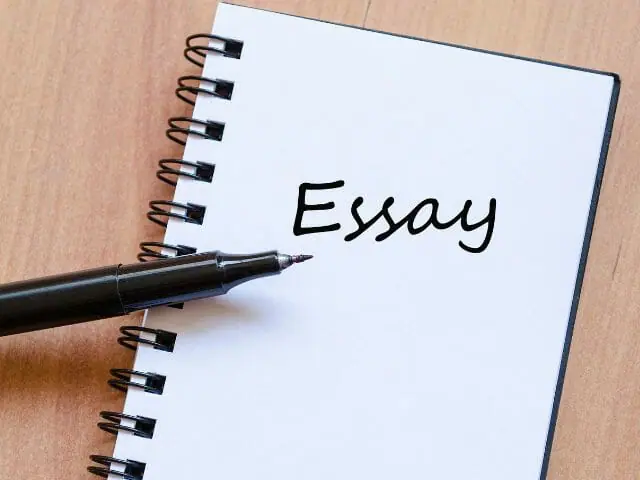
Narrative essays usually tell a story, either personal or fictional. Below are some narrative essay writing prompts that you can use in your classroom:
1. Family conflicts may help strengthen relationships. Describe a shared experience that cemented your family ties.
2. What makes your hometown special? Describe this characteristic.
3. Describe a time when you were in a leadership position. What did you learn from the experience?
4. Tell us about the most hilarious or clever prank you’ve ever played on someone (or been the victim of). What made it amusing?
5. Explain how you like or relate to your favorite television series.
6. When people reach middle age, they may be ashamed of things they used to enjoy. Describe something you liked in the past that you’re now embarrassed by.
7. Tell us about your close relationship with your BFF and its importance to you.
8. Write about a time when you misplaced (or recovered) something of great importance. How did the event influence your view on “Finders keepers; weepers losers?”
9. What do you wish your parents, teachers, or coaches knew about you?
10. Being new to a community or school may be difficult since you don’t know anyone, or it might be thrilling because no one knows who you are and your old life. Describe a time when you were the new kid in school.
11. Trips and vacations offer you and your family a lifetime of memories. Describe your favorite family vacation experience in an essay.
12. Describe a life lesson you’ve learned while engaging in your favorite sport.
13. Special food may be capable of creating long-lasting memories. Describe a particular meal that has stayed with you for a long time.
Compare and Contrast Writing Prompts

In a compare and contrast essay, your students will need to identify the similarities and differences between two or more subjects. Below are some compare and contrast essay writing prompts:
14. They claim, “The pen is mightier than the sword.” In what ways is the pen mightier than the sword?
15. What’s the difference between coffee and tea? How are they similar?
16. What does the phrase “comparing apples to oranges” imply? Are there no similarities between these two fruits?
17. Pick your two favorite role models. What do they have in common, and how do they differ?
18. What’s the difference between a smartphone and a regular phone?
19. What’s the distinction between a cheetah and a tiger?
20. What are some differences and similarities between a drawing and a photograph?
21. What are the similarities and the differences between you and your best friend?
22. Consider the last two family vacations you’ve had. Compare and contrast them.
23. What family characteristics do you have in common with your siblings or relatives?
24. Choose two of your favorite characters from books. What characteristics do they have in common? What sets them apart from each other?
25. Think about the most recent dream you can remember. Compare and contrast it with a nightmare you recently had.
26. Think of your favorite sports team. How do they compare to their biggest rivals?
Expository Essay Writing Prompts

An expository essay requires you to investigate an idea, evaluate the evidence, expound on the main idea, and set forth your argument concisely. Here are prompts to assist your seventh-grade students in building these core writing skills of an expository essay:
27. Would you want to go to a public school, a private school, or be homeschooled? Write an essay about your chosen option.
28. Community service is an excellent experience. Tell us about a time you volunteered at a summer job. What did you do, and how did it make you feel?
29. If you could live in any city in the world, where would you choose? Write an essay describing your ideal hometown and why you want to call it home.
30. What superpower do you wish you had, and why?
31. Your friend expresses an interest in your favorite pastime. Explain it to him.
32. Time capsules are used to preserve history throughout the ages by burying them. What would you put in a time capsule to give a current impression of life?
33. A neighboring city has been hit by a natural catastrophe, which has resulted in the loss of homes and businesses. Describe how you can help.
34. Who do you respect in your life or from history? Describe how their personality or contributions to their community have earned your respect in an essay.
35. A friend wants to know how to prepare your favorite meal. Give your friend a step-by-step description so they can repeat the process.
36. Do you live in a major metropolis or a rural area? Why do you love it or hate it there?
37. It’s tough to be a middle school student when your peers and bullies pressure you. Describe a situation in which you were forced or bullied and how it impacted you.
38. When you’re an adult, what do you want to be? Explain why you’d choose that profession or what you’ll do to get ready for it.
39. Drug or alcohol addictions have a significant impact on many individuals. Discuss the harmful effects of these substances on families and communities.
Creative Essay Writing Prompts

Creative essays are meant to be expressive, imaginative, and original. These writing prompts will get your students’ creative juices flowing:
40. You own two pets from different species. Write a narrative from the perspective of your two pets about a day spent at home alone.
41. A time machine has been discovered in your backyard. What happens when you go inside?
42. Write a short story about your favorite characters from a book, film, or television show.
43. You get snowed in for a week with your family. There’s no electricity or phone service, so what do you do for fun?
44. Write a narrative from the viewpoint of an object found in your refrigerator.
45. You put on a pair of shoes you purchased at a thrift store. You’re whisked away into someone else’s life. Describe what happens next.
46. Consider a scenario in which you were awakened during the middle of a spectacular dream. What would’ve happened if the dream hadn’t been interrupted?
47. You’ve just discovered an unknown island. What’s next for you now that you’ve set foot on it?
48. You get a crumpled package in the mail. Describe the route by which it passed from the sender to you.
49. You discover that your closest friend has been hiding something from you. What is this secret, and why didn’t your pal tell you about it?
50. You’ve just found a door that you haven’t seen before. When you go through it, what happens?
51. Imagine that you’re a pioneer who has established a colony on Mars. Describe a typical day in your new home.
52. You’re listening intently to two people chatting animatedly, but you can’t hear what they’re saying. Make a guess about what they’re talking about.
Descriptive Writing Prompts

Descriptive prompts inspire your students to describe something using vivid language. These prompts can help your seventh-graders get started:
53. Describe the school spirit at your school.
54. How about a rainbow? Write about the last time you saw one.
55. Describe your bedroom in detail. Describe as many features as possible.
56. A school rule has just been abolished. How did the students react?
57. You have a new teacher this year. Describe their unique style.
58. A fire has broken out in your neighborhood. What do you see and smell as you watch the blaze (use your five senses)?
59. The family pet has just passed away. Write about the memories you have of this animal.
60. You’re at a carnival. What sights, sounds, and smells do you take in?
61. Write about a time when you were extremely embarrassed.
62. What does your favorite food taste like? Write a descriptive paragraph about its flavor, texture, and smell.
63. You’ve just returned from a trip to a foreign country. Describe the people, food, and customs that you encountered.
64. Describe a sunset using as many adjectives as possible.
65. You find a mysterious box on your doorstep. What’s inside?
66. You’re at a museum. Describe the paintings, sculptures, and other artwork that you see.
67. You’re chosen to be a contestant on a game show. What do you have to do to win?
Jump In : Essay writing opens up opportunities for your 7th-grade students to write down their thoughts. Guide them as well to appreciate poem reading (and writing) by providing them with my list of 20 Amazing 7th-Grade Poems Your Students Will Love !
Watch Your Students’ Writing Come Alive!
Now that you have a huge list of 7th-grade writing prompts at your disposal, you can use them in any way you see fit.
Assign one prompt as a free-write at the beginning of class and watch your students’ creativity unfold.
Or, have students choose their favorite prompt and write a longer piece that incorporates all of the elements of a good story.
No matter how you use these prompts, your students are sure to have a blast!
Last Updated on July 25, 2022 by Emily
- Pinterest 67
Emily is an active mother of two and a dedicated elementary school teacher. She believes the latest technology has made a huge impact on the quality of early learning and has worked hard to upgrade her classroom and her own children’s learning experience through technology.
Follow her on Twitter , Pinterest , and Instagram for more teaching fun!
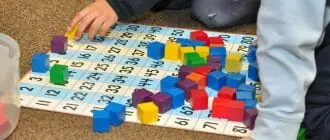
Save my name, email, and website in this browser for the next time I comment.
Unlock Creativity: 7th Grade Writing Prompts for Effective Learning
Writing prompts are a powerful tool to unlock creativity and improve writing skills in 7th graders. They go beyond being just school tasks; they provide valuable opportunities for students to think critically, express themselves, and develop their unique writing voice. In this article, we will explore the importance of writing prompts , different types of prompts, and tips for choosing the right ones for 7th graders.
- Key Takeaways:
- Writing prompts ignite creativity and improve writing skills in 7th graders.
- They help students explore different writing styles and identify strengths and weaknesses.
- There are various types of prompts, including narrative, persuasive, descriptive, and expository.
- Choosing the right prompt involves considering student interests , difficulty level , and learning outcomes.
- Encouraging creativity and critical thinking through writing prompts enhances overall development.
- Understanding the Importance of Writing Prompts
Writing prompts are more than just school assignments; they are valuable tools that can unlock creativity and improve writing skills . By engaging with prompts, students have the opportunity to explore different writing styles, find their unique voice, and identify their strengths and weaknesses in writing. This process helps them become more versatile writers and develop critical thinking skills .
Responding to various types of writing prompts allows students to expand their repertoire. Whether it’s narrative prompts that encourage personal storytelling, persuasive prompts that develop argumentation skills, descriptive prompts that refine sensory observation, or expository prompts that enhance analytical capabilities, each type serves a different purpose. By using a variety of prompts, students can broaden their writing abilities and approach different topics with confidence and creativity.
Writing prompts play a vital role in nurturing students’ writing skills. They provide not only a structured framework for writing but also a platform for expressing thoughts and ideas. By engaging with prompts, students can refine their writing techniques and learn how to effectively communicate their thoughts. Writing prompts also foster critical thinking by challenging students to analyze, interpret, and reflect on various topics and perspectives.
Exploring Different Types of Writing Prompts
In order to effectively engage 7th graders in the writing process, it is important to provide them with a variety of writing prompts that cater to their interests and learning needs. Here, we will explore different types of writing prompts that can inspire creativity and enhance their writing skills.
- Narrative Writing Prompts
Narrative writing prompts encourage students to tap into their imagination and explore personal experiences. These prompts can ask students to write a fictional story or reflect on a memorable event in their lives. By engaging in narrative writing, students learn to develop characters, construct compelling plotlines, and evoke emotions through their writing.
- Persuasive Writing Prompts
Persuasive writing prompts challenge students to express their opinions and defend their viewpoints on various topics. These prompts encourage critical thinking and help students develop their argumentation skills. Whether it’s writing a persuasive essay or crafting a convincing speech, students will learn to use evidence and logical reasoning to support their claims.
- Descriptive Writing Prompts
Descriptive writing prompts focus on refining students’ sensory observation skills. These prompts encourage students to paint a vivid picture with words, describing people, places, or objects in detail. By engaging in descriptive writing, students learn to use descriptive language, engage the senses of their readers, and create a rich sensory experience through their writing.
- Expository Writing Prompts
Expository writing prompts prompt students to analyze and explain a topic in a clear and concise manner. These prompts encourage students to research, gather information, and present their findings in an organized and informative way. Through expository writing, students develop their research and analytical skills while effectively conveying information to their readers.
Tips to Choose the Right Writing Prompt
Choosing the right writing prompt can greatly enhance the engagement and effectiveness of writing activities for 7th graders. By considering student interests , difficulty levels, and learning outcomes, teachers can create a writing environment that is both stimulating and educational.
- 1. Student Interests
One key factor in choosing the right writing prompt is understanding the interests of your 7th graders. Conduct surveys or engage in conversations with students to discover what topics, themes, or genres they enjoy. Additionally, observe their participation in extracurricular activities or discuss their hobbies and passions with their parents or caregivers. By tailoring the prompts to align with their preferences, you can increase their motivation and enthusiasm for writing.
- 2. Difficulty Level
Consider the academic abilities of your 7th graders when selecting writing prompts. It is important to strike a balance between challenging their skills and ensuring they do not feel overwhelmed. Choose prompts that align with their current writing capabilities while encouraging growth and development. Adjust the complexity of the prompts as needed, offering both accessible and more advanced options to cater to the diverse range of students in your class.
- 3. Learning Outcome
Every writing prompt should have a clear learning goal or outcome. Determine what specific skills or concepts you want your students to develop through their writing practice . Whether it’s improving narrative techniques, enhancing persuasive arguments, or refining descriptive language, align the prompts with these objectives. Clearly articulate the learning outcomes to your students, so they understand the purpose and value of each writing assignment.
By carefully considering student interests , difficulty levels, and learning outcomes, you can choose the right writing prompts that will motivate and engage your 7th grade students. Creating a dynamic and tailored writing experience will not only improve their writing skills but also foster a love for writing that will last beyond the classroom.
- Encouraging Creativity in 7th Graders
Encouraging creativity in 7th graders is crucial for their overall development. By providing innovative writing exercises and nurturing artistic expression, teachers can foster a creative mindset in students. Here are some strategies to inspire creativity in 7th graders :
- Brainstorming: Encourage students to generate a wide range of ideas by brainstorming. This can be done individually or in groups, allowing them to explore different perspectives and possibilities.
- Free Writing: Provide dedicated time for students to freely write without any constraints or specific prompts. This allows them to tap into their imagination and explore their unique ideas.
- Visual Prompts: Utilize visual stimuli such as images, paintings, or videos to spark creativity in students. Visual prompts can inspire new ideas and encourage students to think outside the box.
Creating a supportive and non-judgmental environment is also essential in encouraging creativity. Students should feel comfortable taking risks and expressing their ideas without fear of criticism. By nurturing a creative atmosphere, teachers can help 7th graders develop their imaginative thinking skills and unleash their full creative potential.
- Boosting Creative Thinking
Boosting creative thinking in 7th graders involves engaging them in exercises that stimulate their imagination and encourage outside-the-box thinking. By providing creative thinking exercises , teachers can help students tap into their imaginative abilities and develop their creative thinking skills. Here are some effective exercises:
- Imagining Alternative Universes: Encourage students to imagine and create their own fictional worlds, complete with unique rules, characters, and settings. This exercise allows them to explore their creativity and think beyond the boundaries of reality.
- Creating Fictional Characters: Encourage students to develop their own fictional characters, including their appearance, personality, and background. This exercise helps them exercise their imagination and think deeply about character development.
- Solving Imaginative Problems: Present students with imaginary scenarios or problems and challenge them to come up with creative solutions. This exercise encourages them to think critically and find innovative approaches to problem-solving.
By incorporating these creative thinking exercises into the curriculum, teachers can help 7th graders develop their imagination and enhance their ability to think creatively.
Writing Prompts to Boost Critical Thinking Skills
Writing prompts are an effective tool for enhancing critical thinking skills in 7th graders. By providing thought-provoking prompts, students are encouraged to analyze their thoughts, experiences, and opinions. Reflective journal entries , imaginative scenarios, and personal anecdotes are all useful prompts that prompt students to think deeply and critically.
- Reflective Journal Entries
Reflective journal entries are a valuable writing prompt to foster critical thinking skills . By asking students to reflect on their personal experiences and analyze their thoughts and emotions, they develop the ability to think critically about their own lives. This prompts them to consider different perspectives, evaluate their own actions, and identify areas for personal growth.
- Imaginative Scenarios
Imaginative scenarios are another effective type of writing prompt that encourages critical thinking. By presenting students with fictional situations, students are challenged to analyze the given scenario, consider various options, and make informed decisions. This prompts them to think critically about cause and effect, consequences, and problem-solving, which are essential skills in real-life situations.
- Personal Anecdotes
Personal anecdotes provide a valuable opportunity for critical thinking as students reflect on their own experiences. By exploring their own memories, students are prompted to analyze their actions and decisions, consider the impact of their choices, and reflect on any lessons learned. This type of prompt encourages critical reflection and helps students develop a deeper understanding of themselves and their actions.
How to Use Writing Prompts Effectively
Using writing prompts effectively can greatly enhance the writing practice and skill development of 7th graders. By approaching prompts as opportunities for growth and practice, students can make the most out of their writing sessions. Here are some tips to help you use writing prompts effectively:
- 1. Approach prompts as opportunities for growth
Instead of seeing prompts as mere assignments, approach them as chances to improve your writing skills. Embrace the opportunity to explore new ideas, experiment with different writing styles, and expand your creative horizons. Treat each prompt as a learning experience and a chance to develop your writing abilities.
- 2. Brainstorm ideas before you start writing
Before diving into your writing, take some time to brainstorm ideas related to the prompt. Jot down any thoughts, concepts, or examples that come to mind. This will help you organize your thoughts and create a solid foundation for your writing. A brainstorming session can also spark creativity and provide you with fresh perspectives.
- 3. Create an outline to structure your writing
An outline serves as a roadmap for your writing. It helps you organize your ideas and ensures a logical flow in your composition. Divide your writing into sections or paragraphs and outline the main points you want to cover. This will help you stay focused and maintain coherence in your work.
- 4. Revise and refine your writing
Revision is a crucial step in improving your writing. After completing your initial draft, take the time to review and revise your work. Check for grammar and spelling errors, rephrase sentences for clarity, and ensure that your ideas are well-developed. Consider seeking feedback from a teacher or classmate to gain different perspectives and improve your writing further.
By using these strategies, you can effectively utilize writing prompts to enhance your writing practice . Embrace the opportunity to grow as a writer and continually challenge yourself with new and interesting prompts. Practice makes perfect, so keep writing, experimenting, and refining your skills.
Writing prompts offer numerous benefits, helping 7th graders develop their writing skills and nurturing their creative and critical thinking abilities. By incorporating prompts into their teaching strategies, educators can unlock the potential within their students, fostering growth and engagement in the writing process.
One of the key advantages of using writing prompts is their ability to ignite creativity. By providing students with a starting point or a specific theme, prompts encourage them to think outside the box and explore unique ideas. This not only helps students develop their own writing style but also enhances their problem-solving skills and imaginative thinking.
Furthermore, writing prompts are invaluable in developing critical thinking skills. By prompting students to reflect on personal experiences, analyze different scenarios, and express their thoughts, prompts foster the ability to think deeply and critically. Through this process, students learn to evaluate information, form logical arguments, and communicate their ideas effectively – essential skills for success in both academic and professional spheres.
In conclusion, writing prompts provide a structured and engaging way for 7th graders to develop their writing abilities. By encouraging creativity, fostering critical thinking, and guiding students through regular practice, prompts serve as a catalyst for growth and improvement. Incorporating writing prompts into the classroom not only benefits students’ writing skills but also enhances their overall cognitive development and prepares them for future academic and professional success.
- Source Links
- https://www.prodigygame.com/main-en/blog/writing-prompts-for-kids/
- https://brilliantio.com/writing-prompts-for-7th-graders/
- https://www.journalbuddies.com/creative-writing-2/creative-writing-assignments/
Reading Worksheets, Spelling, Grammar, Comprehension, Lesson Plans
7th Grade Writing
For seventh graders, this Common Core area helps students gain mastery of writing skills by working collaboratively and producing written texts, understanding syntax and vocabulary, and organizing their ideas. Among the complete standards for this grade, seventh graders will be asked to: use precise language for written work, including formal style, use appropriate technology to publish writing and to collaborate on written projects, demonstrate keyboarding skill, go through the process of writing, editing and revision for their written work, conduct short research projects to answer a question, quote or paraphrase the data and conclusions of supporting texts while avoiding plagiarism and using proper citation, use evidence from literary or informational texts to support analysis, reflection, and research.
Abraham Lincoln Bio Poem
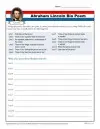
Your students will write a bio poem about Abraham Lincoln.
Back to School Diamante Poem
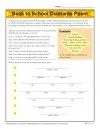
Teach your students a fun way to write diamante poems using our new back to school worksheet.
Bio Poem: My Mother
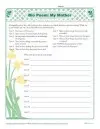
A fun Mother’s Day bio poem activity for your students!
Bio Poem: Pilgrim
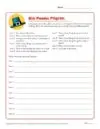
A biography poem, also called a bio poem, is a short poem which describes a person or thing. This printable Thanksgiving Activity guides students through creating a bio poem about Pilgrims.
Bio Poem: Someone You Know
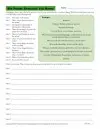
Students will write a bio poem about someone they know using the format set in this worksheet.
Christmas Tree Bio Poem
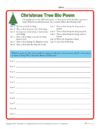
A biography poem, also called a bio poem, is a short poem which describes a person or thing. Sometimes writing a bio pem can be tricky! This printable Christmas Activity guides students through creating a bio poem about a Christmas tree.
Correct the Transition Words Mistakes – Worksheet
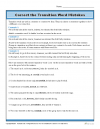
Have your students revise sentences and correct transition word mistakes with this educational writing activity.
Diamante Poem: Antonyms
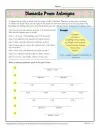
Students write an antonym diamante poem in the space provided.
Diamante Poem: Synonyms
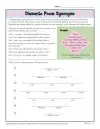
A diamante poem takes its name from the shape it makes: a diamond. Diamante poems were introduced in 1969 by Iris Tiedt. Students write a synonym diamante poem in the space provided.
Edgar Allan Poe; Journalist Trickster

Students read about one of Edgar Allan Poe’s hoaxes when he was a journalist. Each student then write’s their own hoax!
Edgar Allan Poe: Secrets in Poetry
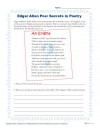
Students read from Edgar Allan Poe’s “An Enigma” and decipher the name of the woman’s whose name is hidden within the text.
Father’s Day Bio Poem: My Father
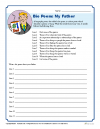
Enhance your students’ writing skills with this fun Father’s Day Biography Poem activity.
Fourth of July Bio Poem: America
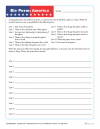
Encourage your students to learn about America with this Fourth of July Biography Poem activity.
George Washington Bio Poem

Your students will write a bio poem about George Washington.
George Washington’s List of Rules
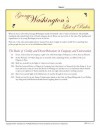
When George Washington was a young boy, he made a list of rules for himself. Students choose one of the rules and write what it means.
Halloween Bio Poem Activity: Ghost

Create a bio poem about your own personal ghost with our fun Halloween printable activity!
Main Idea Organizer
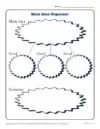
Teach your students how to organize their writing with this helpful Main Idea Organizer. Students will be asked to complete the worksheet by writing their own main idea, three details, and a summary. This will help your students better understand how to organize their ideas for writing in the future, especially when writing an essay!
Newspaper Reporter: An Interview With President Lincoln
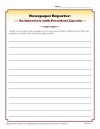
Your student is now an official reporter and their task is to interview President Abraham Lincoln! Students write three questions they would ask him and what his replies would be.
Transition Words: Complete the Sentence
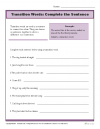
Enhance your students’ writing skills with this “Complete the Sentence” transition words activity.
Using Transition Words
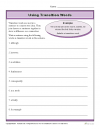
In this worksheet, your students will learn how to properly use transition words in a sentence.
Tech, Media & Entertainment
Writing Topics & Prompts for 7th Grade
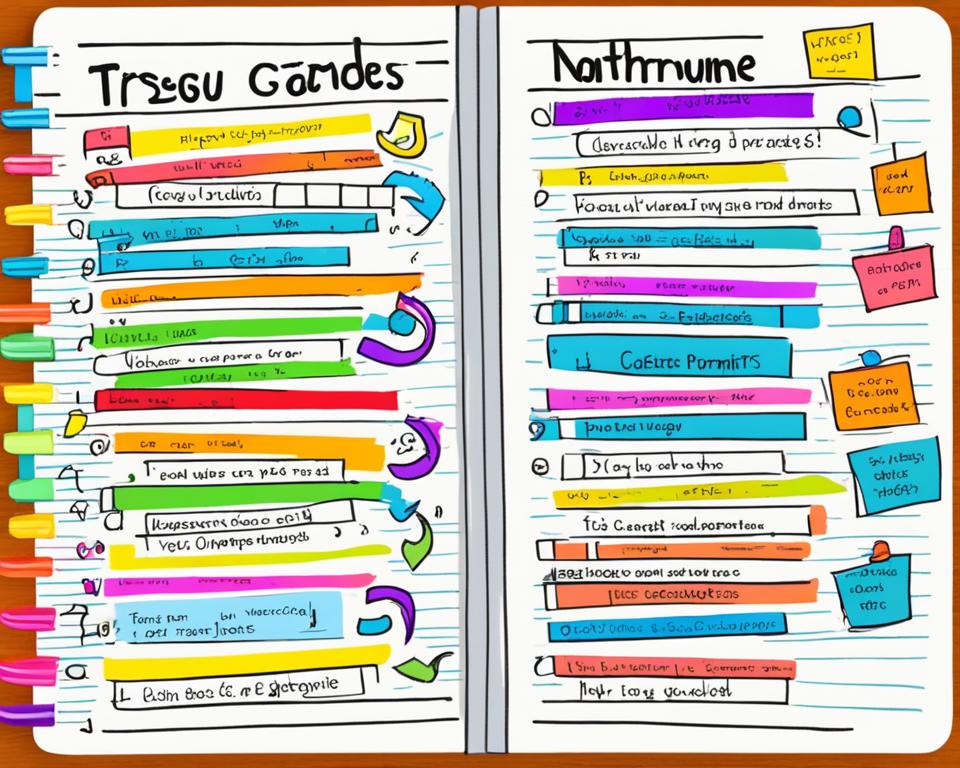
Seventh grade can be a challenging time for students as they navigate new expectations and responsibilities. One way to help them express themselves and explore their thoughts and emotions is through writing. Providing 7th graders with engaging topics and prompts can not only enhance their writing skills but also serve as a therapeutic outlet in the midst of their busy lives.
Key Takeaways:
- Creative writing ideas and middle school writing assignments are beneficial for 7th-grade students.
- Writing prompts offer a safe space for emotional expression and self-reflection.
- Exploring various writing genres can foster creativity and critical thinking.
- Providing additional writing prompts and resources can further enhance students’ writing skills.
- Journaling can help 7th graders develop important life skills and gain a better understanding of themselves.
Table of Contents
The Power of Words for 7th Grade Writers
Writing is a powerful tool that can empower and inspire 7th grade students. Through the art of writing, these young minds can explore and express themselves in ways they may not have thought possible. Journaling provides them with the freedom to unleash their thoughts without interruptions or judgment. It is a beautiful journey where every word becomes a gateway to self-discovery.
Engaging writing topics and prompts play a crucial role in nurturing the creative minds of 7th graders. By presenting them with thought-provoking prompts, we can encourage them to delve deeper into their thoughts and emotions, helping them understand themselves better.
“Words have the power to shape our reality and define who we are. By embracing the art of writing, 7th grade students can unlock a world of endless possibilities and discover the true power of their voice.” – Jane Smith, Writing Coach
Writing prompts provide a roadmap for their creative journey, allowing them to explore different genres and styles of writing. From descriptive narratives to persuasive essays, these prompts offer a diverse range of topics that cater to each student’s unique interests and perspectives.
Journaling: A Pathway to Self-Reflection and Growth
A blank page is an invitation to unleash one’s thoughts and emotions. Journaling provides a safe space for 7th grade students to reflect on their experiences, express their deepest fears and aspirations, and gain a better understanding of themselves.
Through journaling, students can embark on a journey of self-discovery where they explore their values, beliefs, and learn from their triumphs and challenges. It helps them trace their growth and evolution as individuals, fostering self-awareness and emotional intelligence.
Unlocking Creativity with Writing Prompts
Writing prompts spark the creative flame within 7th grade writers. They serve as catalysts, igniting their imagination and guiding them towards creating engaging narratives, compelling arguments, and vivid characters.
Whether it’s crafting a fictional story about a time-traveling adventure or penning a persuasive essay on an important social issue, writing prompts provide the structure and inspiration for students to develop their unique writing styles.
Embracing the Power of Words
As 7th grade students embrace the power of words, they not only enhance their writing skills but also develop essential communication and critical thinking abilities. Writing encourages them to articulate their thoughts effectively, analyze different perspectives, and present logical arguments.
Furthermore, by writing about their own experiences and fictional worlds, these young writers develop empathy and understanding for others. Their words become a bridge that connects different perspectives and promotes empathy, fostering a sense of unity within their classroom and community.
30 Writing Prompts for 7th Grade
Imagination is a powerful tool that can unlock endless possibilities in writing. Here are some fun writing exercises , narrative writing ideas , and persuasive writing prompts to spark creativity and inspire 7th graders on their writing journey:
- Write about a person you admire and explain why they inspire you.
- Describe your greatest belief and the reasons behind it.
- Recount a time when you got caught doing something wrong and reflect on the lessons learned.
- Create a story based on a conversation you would have with a grandparent.
- Imagine you are a character in your favorite book. Rewrite a key scene from your perspective.
- Write a persuasive essay arguing for or against school uniforms.
- Describe a moment when you felt truly courageous and how it impacted your life.
- Use your imagination to write a story set in a magical land.
- Reflect on a time when you felt like an outsider and how it shaped your understanding of empathy.
- Write a letter to your future self, describing your goals and aspirations.
- Imagine you found a time machine. Write a story about the adventures you would have.
- Describe an object that holds sentimental value to you and explain its significance.
- Write a narrative poem about a memorable experience in nature.
- Compose a persuasive speech advocating for the protection of endangered species.
- Imagine you could talk to any historical figure. Write a dialogue between yourself and that person.
- Describe a fictional world where everyone’s dreams become a reality.
- Write a letter to your favorite author, expressing how their work has impacted your life.
- Reflect on a time when you faced a difficult decision and explain the thought process behind your choice.
- Compose a short story with a surprising plot twist.
- Write a persuasive essay arguing for the importance of volunteering in the community.
- Imagine you could have a superpower for a day. Describe how you would use it.
- Recount a childhood memory that holds a special place in your heart.
- Write a letter to your future self, offering advice and encouragement.
- Create a fictional character and describe their personality, appearance, and background.
- Compose a short fantasy story featuring talking animals.
- Reflect on a time when you experienced failure and explain how it helped you grow.
- Write a persuasive essay arguing for the benefits of extracurricular activities.
- Imagine you could travel to any country. Write a journal entry describing your adventures.
- Describe an invention you would create to solve a pressing problem in the world.
- Compose a poem that captures the essence of a favorite place or vacation destination.
These writing prompts cover different genres and encourage 7th graders to unleash their creativity and develop their narrative and persuasive writing skills. Remember, the key to effective writing is to let your imagination soar and have fun along the way.
Bonus List of 30 MORE Prompts and Essay Writing Ideas
In addition to the previous prompts, here are more writing ideas for 7th graders. These additional writing prompts and essay topics offer students even more opportunities to express their thoughts and creativity. Whether they enjoy storytelling, persuasive writing, or reflective essays, there is something for every student to explore.
1. Perspective of an Animal
Imagine you are an animal living in a zoo. Write a narrative from the perspective of that animal, describing your daily life, thoughts, and feelings.
2. The Power of Peer Pressure
Explore the positive and negative effects of peer pressure. Share a personal experience or create a fictional story that highlights the influence of peers and the choices young people face.
3. Changes Brought by Smartphones and the Internet
Reflect on the impact of smartphones and the internet in society. Consider how these advancements have changed communication, relationships, information access, and personal experiences.
4. Creative Writing Based on a Photograph
Select a captivating photograph and use it as inspiration for a short story or poem. Describe the scene, characters, and emotions evoked by the image.
5. The Value of Volunteering
Write an essay discussing the importance of volunteering. Share personal experiences or research examples of how volunteering can make a positive impact on individuals and communities.
6. Historical Figure Who Inspires You
Choose a historical figure who inspires you and explain why they have had a significant impact on your life and values.
“The power of words can change lives and inspire greatness.” – Unknown
These additional writing prompts and essay topics offer 7th graders a diverse range of ideas to explore. Encourage your students to think critically, express their thoughts eloquently, and embrace their creativity. By providing them with a variety of writing opportunities, you can help them develop essential writing skills and foster their love for self-expression.
More Writing Prompts and Resources for 7th Grade
If the previous lists of prompts were not enough, we have got you covered with even more writing prompts and resources for 7th graders. Expand their writing horizons with a PDF worksheet containing 20 thought-provoking prompts. These prompts are designed to inspire creativity and encourage students to reflect on their beliefs and perspectives.
With a wide range of topics, from life goals to the meaning of success, these prompts will challenge 7th graders to think deeply and express themselves effectively. Whether they are exploring their dreams for the future or contemplating the values that matter most to them, these prompts will spark their imagination and help them develop their writing skills.
By engaging with these additional writing prompts, students will gain confidence in their ability to communicate their thoughts and emotions through writing. This resource offers a valuable opportunity for 7th graders to further enhance their creative writing abilities and cultivate a love for self-expression on paper.
“Writing allows students to dive deep into their thoughts and discover new perspectives.”
These writing prompts and resources provide valuable opportunities for 7th graders to explore their creativity, enhance their writing skills, and gain a deeper understanding of themselves and the world around them.
The Importance of Journaling for 7th Grade Students
Journaling can have a profound impact on the lives of 7th grade students. It provides them with a platform to slow down and process their thoughts and emotions. Through reflective writing , students can gain a deeper understanding of themselves and develop essential life skills.
The benefits of journaling are far-reaching. Not only does it serve as a creative outlet, but it also encourages emotional expression . By putting their thoughts and feelings onto paper, students can explore their experiences and beliefs in a safe and non-judgmental space. This process can lead to increased self-awareness and better decision-making.
“Journaling allows students to confront their emotions and make sense of them. It helps them develop a sense of empathy and understanding, both towards themselves and others.” – Dr. Emily Johnson, Child Psychologist
Reflective writing through journaling can also enhance critical thinking skills. As students reflect on their experiences, they are encouraged to analyze and evaluate their thoughts, actions, and beliefs. This practice fosters introspection and promotes a growth mindset, where students learn from their experiences and strive for personal development.
Furthermore, journaling can be a powerful tool for self-discovery and self-expression. It allows students to explore their creativity and experiment with different writing styles and genres. Whether they choose to write narratives, poems, or personal reflections, journaling provides a space for students to develop their unique voice and strengthen their writing skills.
Encouraging Emotional Expression through Journaling
Emotional expression is an essential aspect of journaling. By giving students the opportunity to express their emotions through writing, it not only validates their feelings but also facilitates emotional regulation. Journaling can serve as a cathartic release, allowing students to process challenging emotions and find comfort and clarity.
The act of journaling provides a sense of closure and can be particularly helpful during times of stress or uncertainty. By writing down their worries, anxieties, or frustrations, students can gain a sense of control and perspective. This practice can promote resilience and emotional well-being.
Moreover, journaling can serve as a form of self-care. By dedicating time to reflect on their day, students can prioritize their mental and emotional health. It can help alleviate stress, enhance self-esteem, and improve overall mental well-being.
To reap the benefits of journaling, it is important for 7th grade students to establish a regular journaling routine. Encouraging them to set aside dedicated time each day or week for reflective writing can help make it a consistent habit. Providing guided prompts or topics can also inspire their journaling journey, sparking creativity and promoting self-reflection.
In conclusion, journaling offers numerous benefits for 7th grade students. It provides them with a valuable tool for self-expression, emotional regulation, and personal growth. By incorporating journaling into their daily lives, students can enhance their writing skills, develop self-awareness, and navigate the challenges and triumphs of adolescence with confidence.
Encouraging Writing in 7th Grade
Encouraging 7th graders to write is crucial for their overall development and growth. Writing not only improves their communication skills but also fosters creativity and enhances critical thinking abilities. By creating a supportive and engaging environment, teachers can inspire and motivate students to develop their writing skills. Here are some effective strategies to encourage writing in 7th grade:
Provide Feedback
Feedback plays a vital role in improving writing skills. Take the time to read and provide constructive feedback on students’ work. Highlight their strengths and offer suggestions for improvement. Encourage peer feedback and facilitate discussions to foster a collaborative learning environment.
Offer Writing Prompts
Writing prompts can spark students’ imagination and inspire them to explore various topics. Provide a diverse range of writing prompts, such as personal narratives, persuasive essays, or creative stories. Allow students to choose prompts that resonate with their interests to promote intrinsic motivation.
“Writing prompts can be a springboard for students’ creativity and independent thinking.” – Jane Smith, English Teacher (function () { var randomiser = (Math.random() + 1).toString(36).substring(7); var adID = document.querySelector('#tme_net_670x280_in_article_responsive_r').id = "stpd-" + randomiser; inView('#' + adID).once('enter', (function() { googletag.cmd.push(function() { if(window.innerWidth >= 1000) { googletag.defineSlot('/22729463636/tme.net_670x280_in_article_desktop_r', [[300,250],[336,280],[640,200],[640,100],[320,250]], adID).addService(googletag.pubads()); } else { googletag.defineSlot('/22729463636/tme.net_336x336_in_article_mobile_r', [[300,250],[336,336],[336,320],[320,320],[300,300],[336,280],[320,250],[320,336]], adID).addService(googletag.pubads()); } googletag.display(adID); stpd.initializeAdUnit(adID); }); })); })();
Showcase the Value of Writing
Demonstrate to students the real-world applications of writing. Invite guest speakers, such as journalists, authors, or professionals, to share their experiences and the importance of effective writing in their respective fields. Organize writing contests or publishing opportunities to establish a sense of purpose and accomplishment.
Celebrate Writing Achievements
Recognize and celebrate students’ writing achievements to boost their confidence and motivation. Display exceptional pieces of writing in the classroom or create a wall of fame to showcase their work. Consider publishing a class anthology or organizing a reading session to share their writing with peers and parents.
Promote Writing as a Daily Habit
Encourage students to make writing a part of their daily routine. Dedicate regular time for journaling or free writing exercises. Provide resources such as writing prompts or engaging topics for students to explore on their own. Encourage them to maintain a writing journal to reflect on their experiences and personal growth.
By implementing these strategies, educators can create a nurturing environment that fosters a love for writing and supports the development of essential writing skills in 7th graders.
Writing topics and prompts play a crucial role in the development of 7th-grade students’ writing skills. They not only provide an avenue for self-expression but also encourage students to explore their thoughts and emotions in a creative and structured manner. Through engaging writing ideas and middle school writing assignments , teachers can empower students to become effective communicators and confident writers.
By encouraging and supporting their writing endeavors, teachers can help 7th graders unlock their potential and discover the joy of writing. Creative writing ideas allow students to think outside the box and develop their unique writing style. Furthermore, middle school writing assignments provide an opportunity for students to practice different writing techniques and genres, fostering their growth as writers.
Writing topics and prompts serve multiple purposes for 7th-grade students. They not only improve their writing skills but also enhance critical thinking, empathy, and self-awareness. By reflecting upon their experiences and beliefs, students gain a deeper understanding of themselves and the world around them. Additionally, writing assignments encourage students to develop organization, coherence, and clarity in their writing, essential skills for effective communication in the future.
In conclusion, providing writing topics and prompts for 7th-grade students is an invaluable tool for their academic and personal growth. It instills a love for writing, nurtures creativity, and empowers students to express themselves confidently. By incorporating creative writing ideas and middle school writing assignments into the curriculum, teachers can cultivate a generation of skilled writers who are equipped with the tools to thrive in their future endeavors.
What are some writing prompts and topics for 7th graders?
Some writing prompts and topics for 7th graders include writing about a person they admire, their greatest belief, a time they got caught doing something wrong, and a conversation with a grandparent. There are also prompts to write from the perspective of an animal in a zoo, explore the effects of peer pressure, and reflect on the changes brought about by smartphones and the internet. A PDF worksheet with 20 more writing prompts is also available.
How can writing help 7th graders?
Writing can help 7th graders explore and express themselves. It allows them to delve into their thoughts without interruptions or judgment. Writing prompts can help them understand themselves better and document their journey.
What are the benefits of journaling for 7th grade students?
Journaling can be a powerful tool for 7th grade students. It helps them slow down and sort out their thoughts and emotions. By reflecting on their experiences and beliefs, students can gain a better understanding of themselves and develop important life skills.
How can teachers encourage 7th graders to write?
Teachers can encourage 7th graders to write by providing feedback, offering writing prompts, and showcasing the value of writing. Creating a supportive and engaging environment can help students build their communication skills, foster creativity, and enhance critical thinking abilities.
Why are writing topics and prompts important for 7th grade students?
Writing topics and prompts are essential for 7th grade students to explore their thoughts and emotions. They provide an outlet for self-expression and help develop important writing skills. By encouraging and supporting their writing endeavors, teachers can empower 7th graders to become effective communicators and confident writers.
Related Posts

Oinking Good Time: Exploring Swine-Inspired Adventures in Pig-Themed Slot Games

Digital Shift: How Online Casinos Reshape the Landscape for Traditional Gaming Hubs
7th grade writing
by: Hank Pellissier | Updated: August 4, 2022
Print article

Seventh graders need to avoid dangling modifiers, hasty drafts, and plagiarism! They rewrite to tighten their writing. They critique each other’s essays to learn what’s vague or missing. Finally, they study phrases, clauses, and sentence structure.
Seeing both sides
Your young adult’s critical thinking skills will be put to use this year. In argument papers , students express their fact-based opinions. In a strong paper, they also acknowledge — and use facts to argue against — opposing viewpoints. Your seventh grader’s writing should demonstrate an in-depth understanding of the topic, use clear logic, and incorporate solid evidence from reputable sources .
Your child’s papers should be written in formal language, with clear introductions and concise conclusions that summarize their position. Sounds pretty adult, right? Never fear, assignments are often on tween-friendly social issues, such as Do middle schoolers spend too much time on Instagram ?
We formally inform you
Your seventh grader will also write informative and explanatory papers on science and social studies topics. They’ll be expected to employ a range of “strategy tools” such as:
- Adding definitions for complex words or ideas.
- Using academic vocabulary .
- Adding concrete details.
- Choosing quotations.
- Comparing and contrasting concepts.
- Citing cause-and-effect relationships.
- Classifying information.
- Formatting (e.g., headings, bullet points).
- Including graphics (e.g., charts, images) and multimedia.
The language your child uses in these papers should be formal and precise. They should use transition words (e.g. so, if, for, as, and but ) and phrases (e.g. in view of these facts, under these particular circumstances ) to connect ideas and help their writing flow. Finally, your child write have a succinct synopsis as a conclusion.
Believe it.. or not?
Some of the most fun — and challenging — writing of the year will be narrative story assignments that portray actual events (e.g. memoirs, personal history ) or imagined experiences (e.g. fiction, fantasy ). Your child should experiment with effective storytelling techniques. These may include character development, plot twists and pacing, precise descriptions, tone of the narrator’s voice, crisp dialogue, and adventurous action. In class, kids will learn and practice transition vocabulary to help guide readers from one scene or timeframe to another (e.g. Meanwhile, back at the space station; Centuries earlier, when Brontosaurus first roamed the swamps… ).
Tear it apart and start again
Don’t be dismayed if your seventh grader is asked to replan, re-outline, revise, re-edit, and/or rewrite many of their papers. This isn’t perfectionism or punishment — it helps students sharpen the precision, complexity, pacing, and variation of their literary technique. “By the time I am nearing the end of a story,” says Roald Dahl, author of Charlie and the Chocolate Factory , “the first part will have been reread and altered and corrected at least 150 times. …Good writing is essentially rewriting.”
Collaborating online
Seventh graders interact and collaborate online to create and publish writing that links to online sources. Regular online communication with teachers — often in Google docs and other sharing tools — is increasingly prevalent, along with emailing or uploading completed assignments. The challenge for kids? Believable replacements for the classic excuse: “My dog ate my homework.”
Understanding and avoiding cheating
Seventh grade is the year of short research projects using sources like reference books, magazines, and data found online. Your young researcher will learn how to judge the accuracy and credibility of their sources . (For example, Does MAD Magazine have the same integrity as the Boston Globe ? No!) Kids learn to paraphrase information and use quotes to avoid plagiarizing. To plagiarize is defined as “ to copy another person’s ideas, words or work and pretend that they are your own,” and it is a form of cheating that has reached epidemic proportions. Citing their work correctly is the antidote for this error. Papers should follow formats for citations and end with a bibliography.
Grammar with a capital G
Kids learn about phrases , defined as two or more words that express an idea but are not a complete thought or sentence because phrases don’t have a subject and a verb. Kids also learn two types of clauses . Dependent clauses have a subject and a verb and form part of a sentence. Independent clauses have a subject and a verb and create short, complete sentences inside larger sentences.
Seventh graders learn to recognize and use four kinds of sentences . Simple sentences have a single independent clause, with one subject and one verb, e.g., Harold eats pie . Compound sentences have two or more independent clauses, connected with a conjunction, e.g., Harold eats pie because it’s delicious . Complex sentences contain one independent clause and one dependent clause. e.g., Harold eats pie whether it’s hot or cold . Compound complex sentences have at least two independent clauses and one dependent clause. e.g., Jerry eats pie because it’s delicious whether it’s hot or cold .
The common mistake of dangling modifiers happens when modifying words are disconnected from the word they’re meant to modify or the attachment is vague. For example: Alice painted the turtle on the table. Did Alice paint a picture of a turtle on the table surface? Or did she paint the shell of the turtle itself? We’re just not sure.
Seventh graders also start to learn how to use commas correctly. Commas separate adjectives that are equal in value in terms of how they modify the word they describe. If you can reverse the order of the adjectives, then they are equal and you need a comma. For example, Jordana found a red, vintage bag at the thrift store . Since you could also describe it as a vintage, red bag, you need a comma. But you don’t need a comma in this sentence: Mateo wore a yellow rain jacket . Why? Because the reverse order — a rain yellow jacket — makes no sense (unless we’re talking about new species of wasp).
Speak up for the back row
A new focus for writing instruction is that writing should involve a lot of… talking. That’s right. Oral presentations will take center stage for many of your seventh grader’s assignments. The idea is to present their research-backed opinions, arguments, or ideas to their classmates aloud, using formal language, clear pronunciation, and at a volume loud enough for everyone in the class to hear. Kids’ presentations should be well-organized, share main points, and include relevant details and examples. Many presentations will include visual and multimedia displays. Again, it sounds like a lot, but it’s meant as practice to set your child up for real-world, on-the-job success in the future.
Here’s a preview of the presentation skills required in high school.

Homes Nearby
Homes for rent and sale near schools

6 ways to improve a college essay

Quick writing tips for every age

Writing on the wall
Why parents must teach writing
Yes! Sign me up for updates relevant to my child's grade.
Please enter a valid email address
Thank you for signing up!
Server Issue: Please try again later. Sorry for the inconvenience

How to Improve Writing in Seventh Grade
Written by Dan
Last updated January 31, 2024
Improving writing skills is crucial to academic success, and seventh-grade students are no exception. Writing is a fundamental skill that students need to master, and it is essential to start early. However, many students struggle with writing, and it can be challenging to know where to begin.
Related : For more, check out our article on How To Make Writing Fun here.
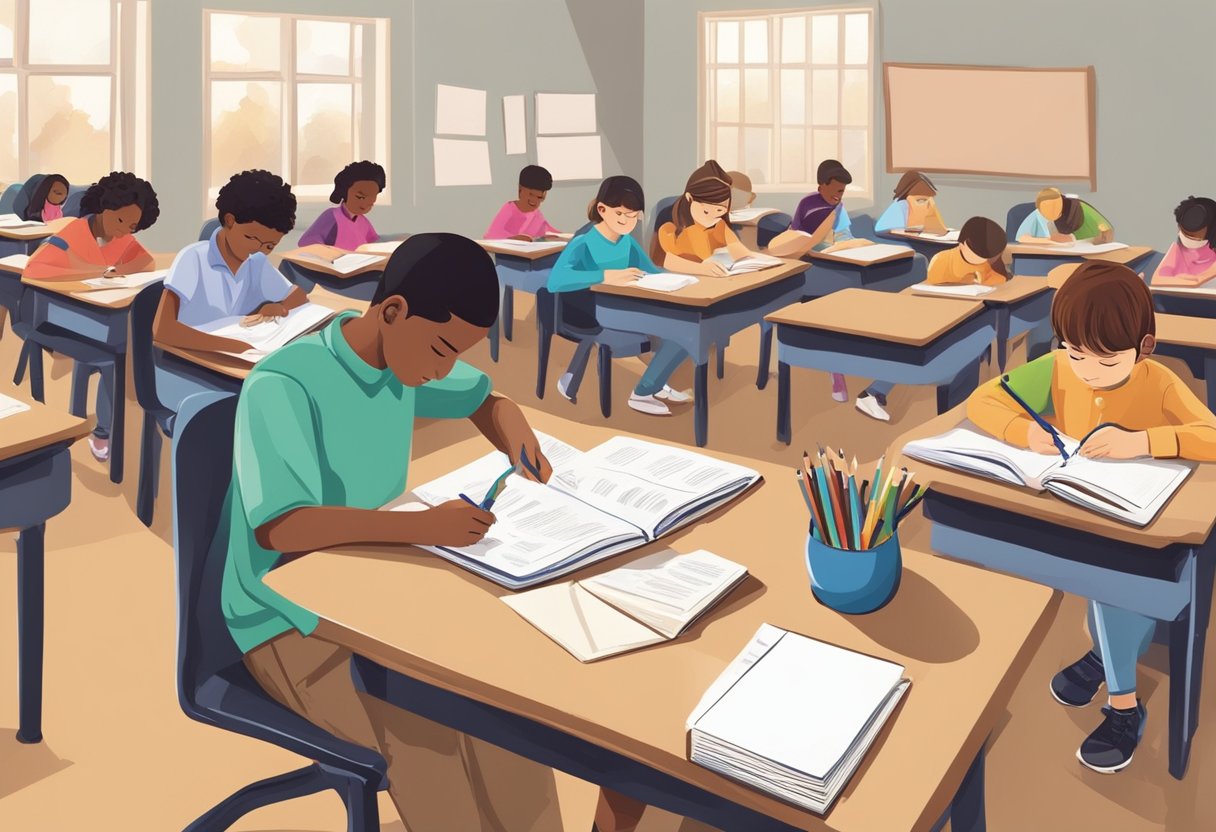
To improve writing skills in seventh grade, students need to understand the basics of writing, practice regularly, and receive feedback. Reading is also essential to improving writing skills, as it helps students develop their vocabulary and grammar.
Additionally, technology can play a significant role in enhancing writing skills, providing students with various tools and resources to improve their writing.
Table of Contents
Key Takeaways
- Understanding the basics of writing is essential to improving writing skills.
- Reading can help students develop their vocabulary and grammar, which is crucial for writing.
- Regular practice, feedback, and the use of technology can significantly enhance writing skills.
Related : For more, check out our article on How To Improve Writing In Sixth Grade here.
Understanding the Basics of Writing
Writing is a fundamental skill that students must learn in their academic journey. In seventh grade, it is essential to understand the basics of writing to improve writing skills.
This section will cover the writing process, vocabulary, phrases, and styles.
The Writing Process
The writing process involves several steps that students must follow to produce a complete piece of writing. The following table summarizes the steps involved in the writing process:
Prewriting involves brainstorming ideas, researching, and outlining. Drafting is the stage where the student writes the first draft.
Revising involves reviewing and refining the draft, while editing involves correcting errors in grammar, spelling, and punctuation . Publishing is the final stage where the student shares the finished product.
Related : For more, check out our article on How To Improve Writing In Fifth Grade here.

Vocabulary and Phrases
Vocabulary and phrases are essential components of writing. Students must have a good command of vocabulary to express their ideas effectively. The following list provides some useful phrases that students can use in their writing:
- In addition to
- Furthermore
- On the other hand
- Nevertheless
- Consequently
- In conclusion
Writing Styles
Writing styles refer to the tone and voice that the writer uses in their writing. The following list provides some common writing styles:
- Descriptive
- Argumentative
Students must understand the different writing styles to choose the appropriate one for their writing task. For instance, if the task requires the student to tell a story, they should use the narrative style.
Understanding the basics of writing is crucial for seventh-grade students to improve their writing skills. They must follow the writing process, have a good command of vocabulary and phrases, and choose the appropriate writing style for their task.
Related : For more, check out our article on How To Teach Children To Add Suspense To Their Writing here.
Improving Writing Through Reading
Importance of Reading
Reading is an essential aspect of improving writing skills in seventh graders. Reading helps students to gain exposure to different writing styles, expands their vocabulary, and improves their comprehension skills .
A student who reads regularly can quickly identify the structure of a sentence, the use of grammar, and the correct use of punctuation marks.
Furthermore, reading helps students to develop their critical thinking skills, which is an essential component of writing. Students read and are exposed to different perspectives, ideas, and concepts.
This exposure helps them to develop their ideas and opinions, which they can use to create compelling and persuasive written content.
Types of Reading Materials
Seventh graders can use different types of reading materials to improve their writing skills. These materials include books, magazines, and online articles.
Books are an excellent source of reading material as they provide in-depth information on different topics. Students can choose books on different genres such as fiction, non-fiction, and biographies.
Fiction books help students to develop their imagination and creativity, while non-fiction books provide factual information on different topics.
Magazines are another great source of reading material for seventh graders. Magazines provide a wide range of information on different topics such as science, history, and current events.
They also provide a platform for students to read articles written by different authors, which helps them to identify different writing styles.
Reading is an essential aspect of improving writing skills in seventh graders. It helps students to develop their critical thinking skills, expand their vocabulary, and improve their comprehension skills.
Students can use different types of reading materials such as books and magazines to improve their writing skills.
Writing Practice and Exercises
Seventh-grade students can significantly improve their writing skills by practicing regularly. Writing practice and exercises can help students to develop their writing abilities, enhance their creativity, and improve their critical thinking skills.
Here are some effective writing practice and exercises that seventh graders can use to improve their writing skills.
Writing Prompts
Writing prompts are an excellent way to help seventh graders develop their writing skills. Writing prompts can be used to inspire students to write about different topics, such as personal experiences, current events, and fictional scenarios.
Writing prompts can help seventh graders to improve their vocabulary, grammar, and syntax.
Here are some examples of writing prompts for seventh graders:
- Write a short story about a character who discovers a mysterious object in their backyard.
- Write a persuasive essay about the importance of recycling.
- Write a descriptive paragraph about your favorite place in the world.
Worksheets and Assignments
Worksheets and assignments are another effective way to help seventh graders improve their writing skills. Worksheets and assignments can help students to practice their writing skills, learn new writing techniques, and improve their research skills.
Here are some examples of writing worksheets and assignments for seventh graders:
- Write a character analysis of a character from a book you have read.
- Write a compare and contrast essay about two different cultures.
- Write a research paper about a historical event.
Short Research Projects
Short research projects are an excellent way to help seventh graders improve their writing skills. Short research projects can help students to develop their research skills, learn how to organize their ideas, and improve their writing skills.
Here are some examples of short research projects for seventh graders:
- Research a famous person and write a biography about them.
- Research a current event and write a news article about it.
- Research a scientific experiment and write a lab report about it.
Writing practice and exercises are essential for seventh graders who want to improve their writing skills.
Writing prompts, worksheets and assignments, and short research projects are all effective ways to help students develop their writing abilities, enhance their creativity, and improve their critical thinking skills.
The Role of Technology in Enhancing Writing Skills
Technology has played a significant role in enhancing writing skills for seventh-grade students. The internet has opened up many resources and multimedia tools that students can use to improve their writing abilities.
In this section, we will explore two of the most critical ways in which technology can help students improve their writing.
Online Resources
The internet is a treasure trove of resources students can use to improve their writing. Numerous websites offer free writing prompts, grammar lessons, and writing tips.
These resources can help students develop their writing skills by providing them with the necessary tools and guidance.
One of the most significant advantages of online resources is that they are accessible to everyone. Students can access these resources from anywhere, at any time, as long as they have an internet connection.
This means that students can work on their writing skills at their own pace, without having to worry about being on campus or in the classroom.
Multimedia Tools
Multimedia tools are another way in which technology can help students improve their writing skills. These tools include software and apps that allow students to create multimedia presentations, videos, and other forms of digital media.
By using these tools, students can develop their writing skills more engagingly and interactively.
Multimedia tools can help students develop their writing skills by allowing them to experiment with different forms of media. For example, students can create videos incorporating text, images, and sound to convey their ideas.
This can help students develop their writing skills by encouraging them to think creatively and critically about how to communicate their ideas effectively.
In conclusion, technology has played a significant role in enhancing writing skills for seventh-grade students. Online resources and multimedia tools are just two of the many ways in which technology can help students develop their writing abilities.
By using these tools, students can improve their writing skills in a more engaging and interactive way, and at their own pace.
Feedback and Revision
Editing and Proofreading
Editing and proofreading are essential components of the writing process. Seventh-grade students should be taught to review their work for errors in grammar, punctuation, and spelling.
They should also learn to identify and correct awkward phrasing or unclear sentences. A good strategy is to have students read their work aloud, as this can help them identify errors they might not have noticed otherwise.
Teachers can also provide feedback on student writing by using a rubric or checklist to evaluate the quality of the work.
This can help students understand what they need to improve and how to do it. Teachers can also provide specific feedback on areas that need improvement, such as grammar, sentence structure, or organization.
Teacher and Peer Reviews
In addition to self-editing, students can benefit from receiving feedback from their peers and teachers. Peer reviews can be done in small groups, where students read and evaluate each other’s work.
This can help students learn to give and receive constructive feedback, as well as improve their own writing by seeing examples of strong writing from their peers.
Teachers can also provide feedback on student writing by meeting with students individually or in small groups. This allows teachers to provide more detailed feedback and address specific concerns.
Teachers can also use technology tools to track student progress and provide feedback online.
In conclusion, feedback and revision are essential components of the writing process for seventh-grade students.
By teaching students to edit and proofread their own work, and by providing feedback from peers and teachers, students can improve their writing skills and become more confident writers.
Related Posts

About The Author
I'm Dan Higgins, one of the faces behind The Teaching Couple. With 15 years in the education sector and a decade as a teacher, I've witnessed the highs and lows of school life. Over the years, my passion for supporting fellow teachers and making school more bearable has grown. The Teaching Couple is my platform to share strategies, tips, and insights from my journey. Together, we can shape a better school experience for all.

Join our email list to receive the latest updates.
Add your form here
- Try for free
7th Grade Language Arts and Writing
- Most Popular
- Most Recent
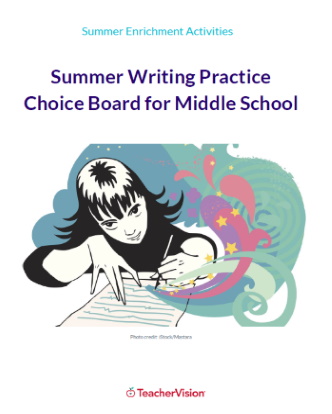

IMAGES
VIDEO
COMMENTS
The post is now updated and includes a grand total of 60 writing prompts and essay ideas. Take a look and enjoy. Yeppers. As seventh graders get ready to transition into their turbulent teenage years, it's incredibly important for teachers to do everything they can to keep their students focused and grounded. Table of Contents.
Explain. Write an essay about the importance of mental health. Tell the detailed story about how you met your best friend. Write a story about a 7th grader whose determination to be the best gets them into trouble. Pick an athlete and write 5-7 paragraphs about their accomplishments. Explain why you admire them.
Spark your students' interest with these 100 7th grade expository writing prompts, including compare and contrast prompts, descriptive writing ideas, and more. Dictionary Thesaurus Sentences Grammar ... Maybe it was a woodworking project, a snack, a scarf, or something else. Tell how you made it.
5. Make up a story about a seventh-grader who plays an April Fool's joke on classmates. 101 Great Middle School Writing Prompts. 6. Draft a gracious letter to the air, thanking it for all of its benefits. 7. Recall a memory of your sibling, cousin, or friend doing something hilariously funny. 8.
Narrative 7th Grade Writing Prompts. Write a narrative essay about an important time in your life. Describe the last time you felt extremely happy. Write a short story about meeting your role model. Tell the story of your first day at middle school. Narrate a story about your favorite book coming to life.
From persuasive writing prompts to compare and contrast, we have much to help 7 th graders refine their core writing skills. We'll discuss: Compare and contrast writing prompts. Persuasive writing prompts. Expository essay writing prompts. Creative essay writing prompts. Descriptive essay writing prompts.
100 Writing Prompts for 7th Graders. Personal writing is like opening a window into your soul, allowing fresh insights to pour in and old doubts to flutter out. Every prompt is an invitation, a beckoning to delve deeper into your own psyche, experiences, and aspirations. From your bravest moments to your most profound failures, these questions ...
Writing Prompts for 7th Grade. By seventh grade, students should be refining the core writing skills of brainstorming, researching, outlining, drafting, and revising. In order to hone these skills, seventh-grade students need regular practice writing a variety of essay styles, including narrative, persuasive, expository, and creative essays.
Describe a usual day in the life of a printer. 4. Describe what things you would do if you could trade places with any famous person for a day. 5. Write a recipe teaching seventh graders how to show kindness. 6. Describe a new city you founded. 7. For a day, you are a chair.
Children will be inspired to reflect on their experiences and consider their future objectives due to the seventh-grade writing prompts. 7th grade symbolizes the start of academic education and the transition to secondary school. It presents unique difficulties for many children. This is the ideal moment to encourage pupils to begin a notebook ...
7th-Grade Writing Assignments. For this grade, essay assignments sound more fun. If you want to gauge the understating of your students at this point, give them writing assignments. Essays provide them with the ground to show their level of understanding is a new level. What Are Some Good Writing Prompts Ideas?
Creative Essay Writing Prompts. Creative essays are meant to be expressive, imaginative, and original. These writing prompts will get your students' creative juices flowing: 40. You own two pets from different species. Write a narrative from the perspective of your two pets about a day spent at home alone. 41.
In this article, we will explore the importance of writing prompts, different types of prompts, and tips for choosing the right ones for 7th graders. Key Takeaways: Writing prompts ignite creativity and improve writing skills in 7th graders. They help students explore different writing styles and identify strengths and weaknesses.
Using Transition Words. In this worksheet, your students will learn how to properly use transition words in a sentence. Grade Levels: 4th and 5th Grade, 6th - 8th Grade, Grades K-12. CCSS Code (s): W.5.2.c, W.6.2.c, W.7.2.c. 2. Free, printable ELA Common Core Standards Worksheets for 7th grade writing skills. Use activities in class or home.
Creative writing ideas and middle school writing assignments are beneficial for 7th-grade students. Writing prompts offer a safe space for emotional expression and self-reflection. Exploring various writing genres can foster creativity and critical thinking. Providing additional writing prompts and resources can further enhance students ...
Seventh Grade Creative Writing Worksheets. Authored by: TeacherVision Staff. Last edited: January 21, 2023. Let your seventh-grade students show you how imaginative they can be, with our most popular creative writing printables. We have plenty of poetry and short-story activities for them to enjoy, plus many other types of lessons!
Good writing is essentially rewriting." Collaborating online. Seventh graders interact and collaborate online to create and publish writing that links to online sources. Regular online communication with teachers — often in Google docs and other sharing tools — is increasingly prevalent, along with emailing or uploading completed assignments.
Skill Builders: Word Analogy Questions, Week 1. Week 1: Word analogies to sharpen students' thinking skills and prepare them for standardized tests. Subjects: Vocabulary. Reading Comprehension. Language Arts and Writing. Download. Add to Favorites.
To improve writing skills in seventh grade, students need to understand the basics of writing, practice regularly, and receive feedback. ... Prewriting involves brainstorming ideas, researching, and outlining. Drafting is the stage where the student writes the first draft. ... Here are some examples of writing worksheets and assignments for ...
Browse our printable 7th Grade Language Arts and Writing resources for your classroom. Download free today! ... This creative writing assignment challenges students to write from the perspective of an inanimate object. ... with both contributing their thoughts and ideas to… Subjects: Language Arts and Writing. Writing. Download. Add to ...
Teach your students narrative writing with this engaging, hands-on unit!This 3 week unit aligns with Lucy Calkins and meets every Common Core Standard for 7th grade narrative writing. This no-prep unit includes lessons plans, PowerPoint slides, mentor texts, graphic organizers, assessments, assignments, and more!